Civil War Ephemera and Other Collectible Documents
FIVE DOCUMENTS RELATING TO SOUTH CAROLINA AND CHARLESTON ON THE VERGE OF WAR!
It is not often I get excited about documents, but these are some of the most historically significant documents I have ever had the pleasure of handling: official, clerical retained copies of correspondence and instructions relating to the secession of South Carolina, the crisis at Fort Sumter, and eventually the price for the conflict paid by the city of Charleston. The state owned copies of these can be turned up in simple online searches. These were probably retained as personal copies by one of the many officials involved in the early movement for secession in South Carolina and likely came north as war souvenirs. With Lincoln’s election in November, 1860, South Carolina secessionists went into overdrive and six weeks later a state convention passed an ordinance of secession claiming the dissolution of the Union, and in accordance with that determination state officials decided to open negotiations with Washington for the transfer of Federal facilities within their borders. Major Anderson, in charge of Federal troops at Charleston moved his men to Fort Sumter in late December, but instead of pulling out, the Federal government sent reinforcements and supplies on the USS Star of the West, which was fired on by state forces on January 9, 1861. Negotiations were then halted and the governor demanded Anderson surrender two days later. Anderson declined, but agreed that envoys would go to Washington to try to straighten things out. South Carolina Governor Pickens then sent Attorney-General Isaac W. Hayne as the envoy to meet with (still) President Buchanan and demand the fort. Isaac William Hayne (1809-1880) was the state Attorney-General and had been the man who officially read out the ordinance of secession. A member of a prominent South Carolina family, among his relatives was Robert Y. Hayne, Senator and Governor, who engaged in a famous debate with Daniel Webster in 1830, and was active in the nullification convention in South Carolina in 1832. Isaac Hayne was admitted to the barr in 1831 and after practicing law for a time in Alabama, returned to South Carolina in 1848 and was elected repeatedly to the office of Attorney General (an office Robert Y. Hayne had also held,) a post he held continuously from 1848 to 1868.
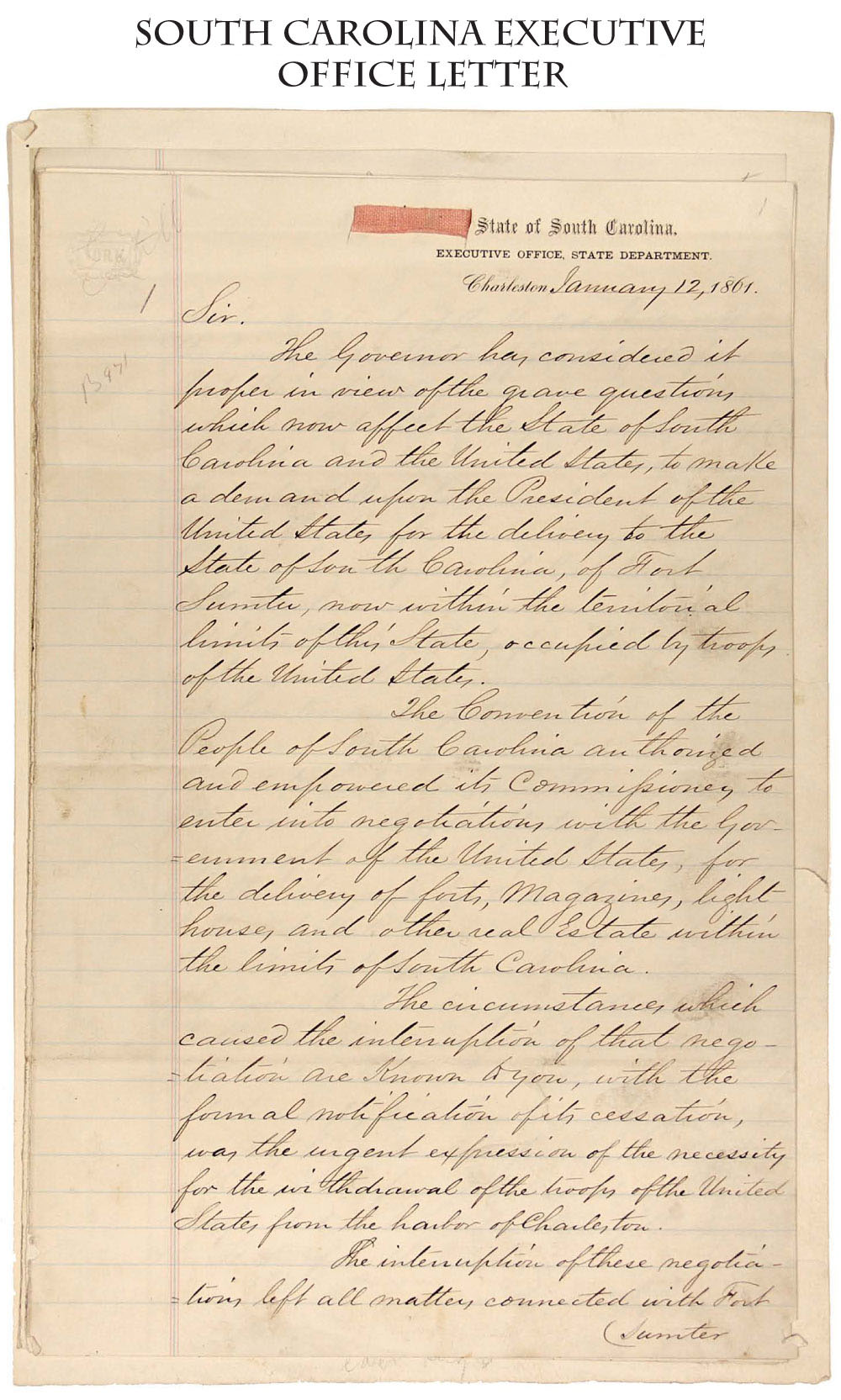
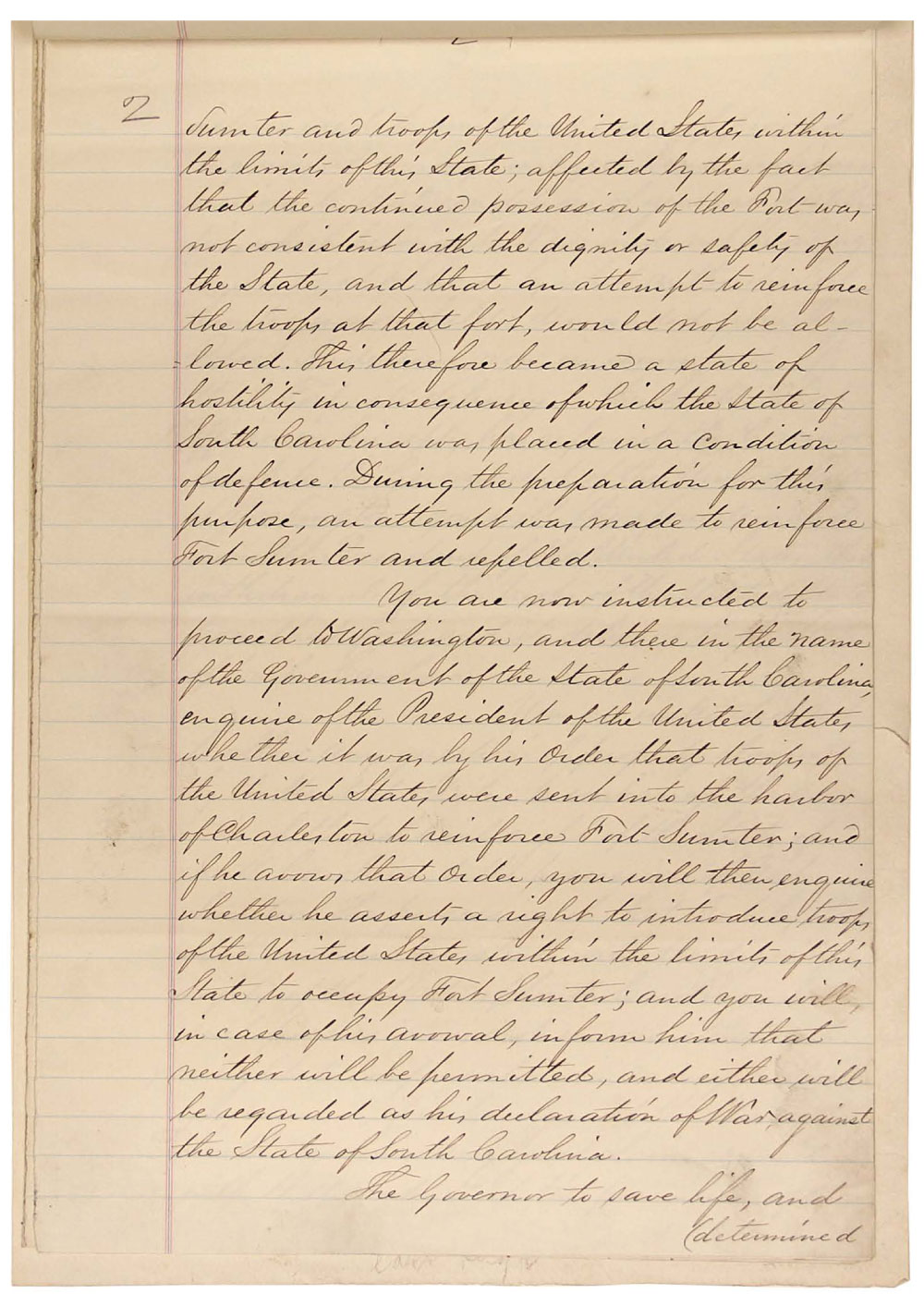
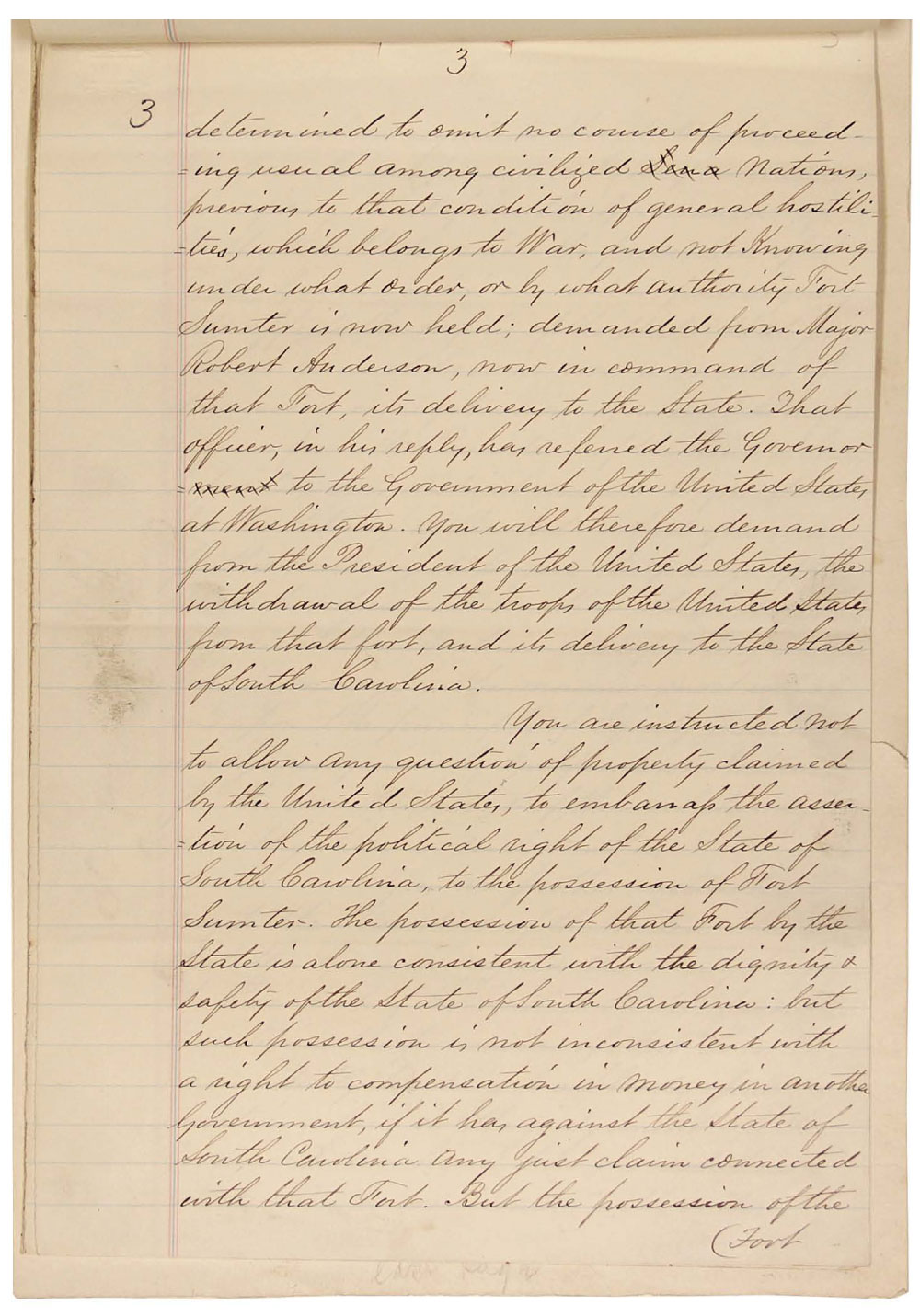
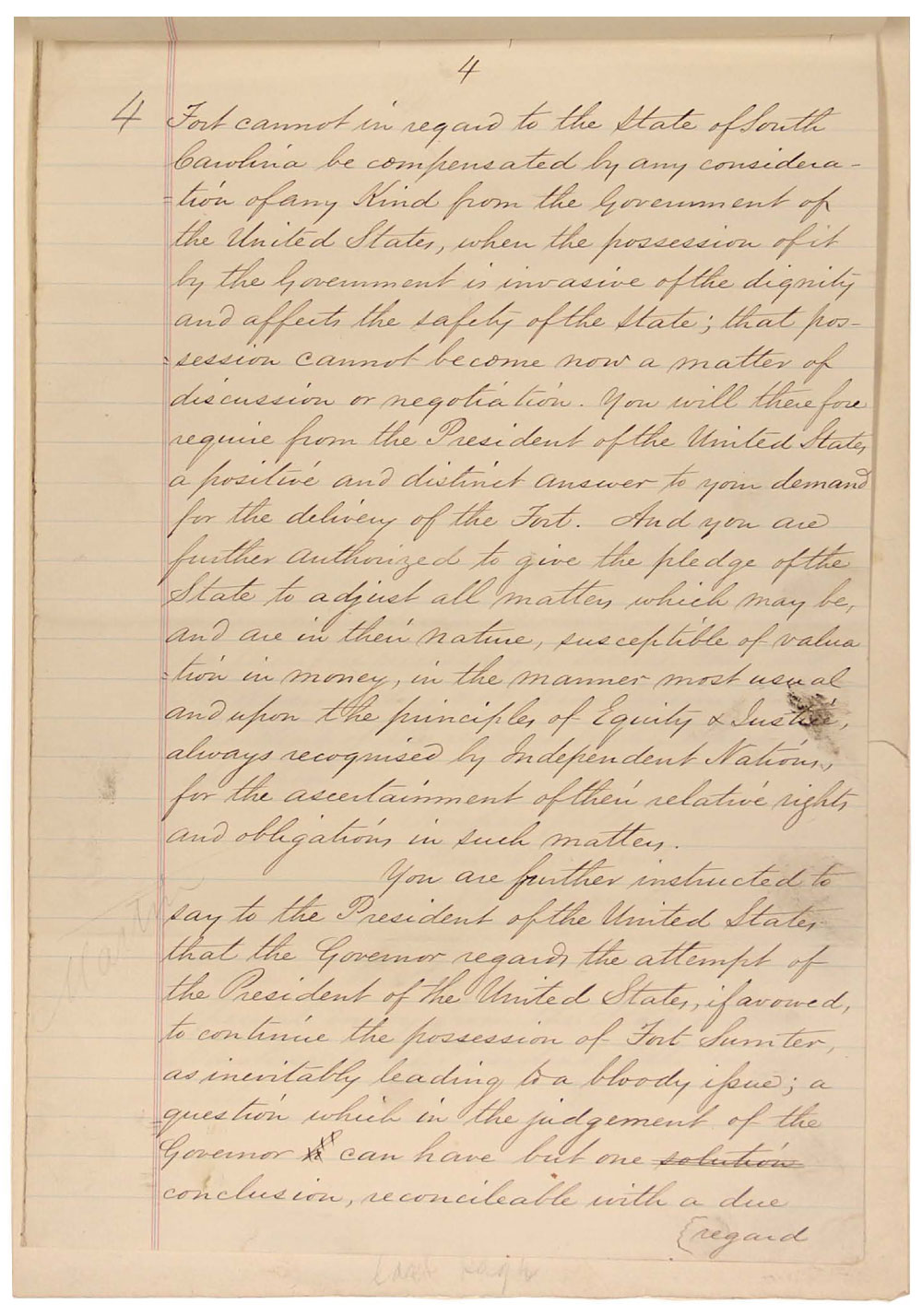
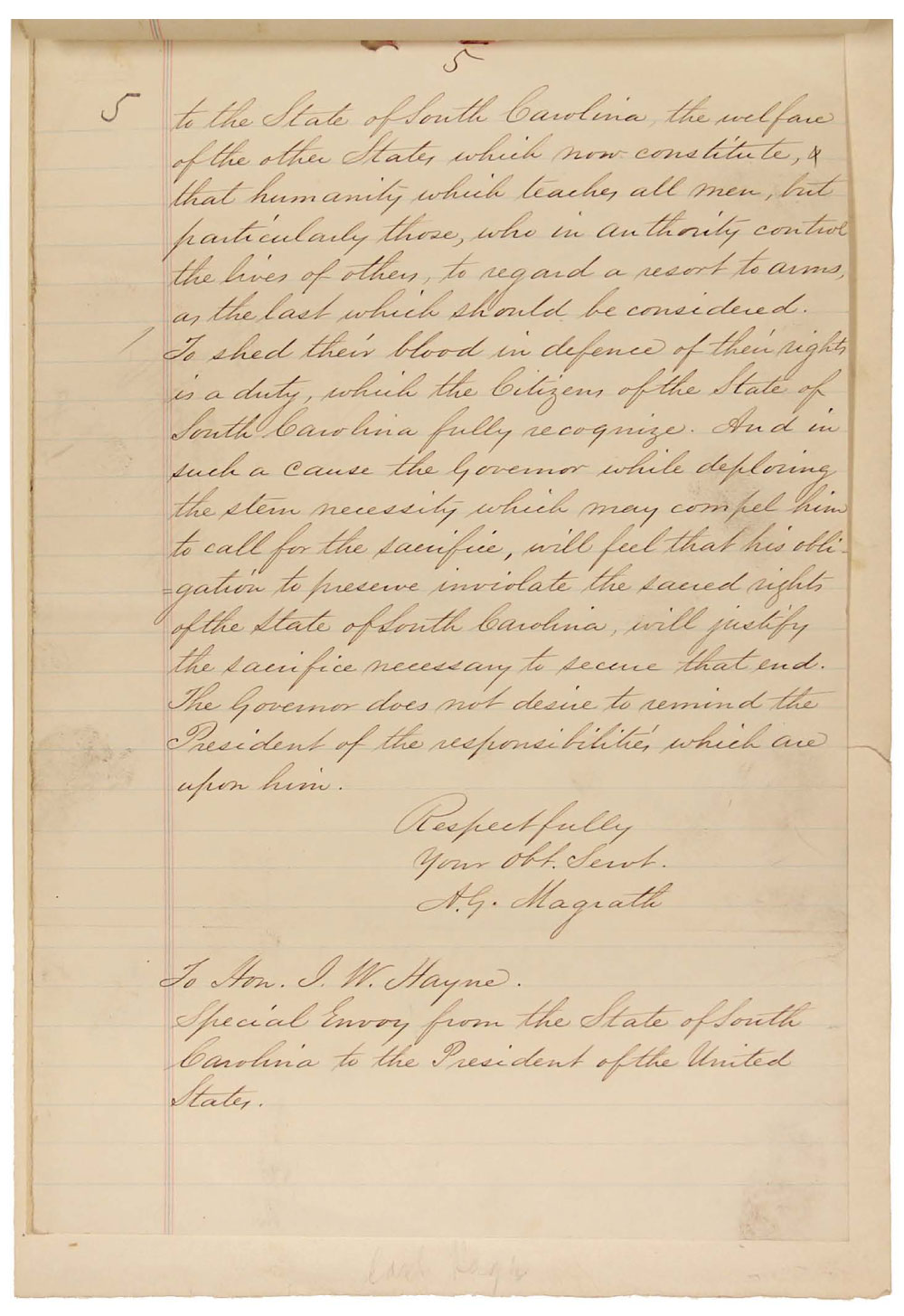
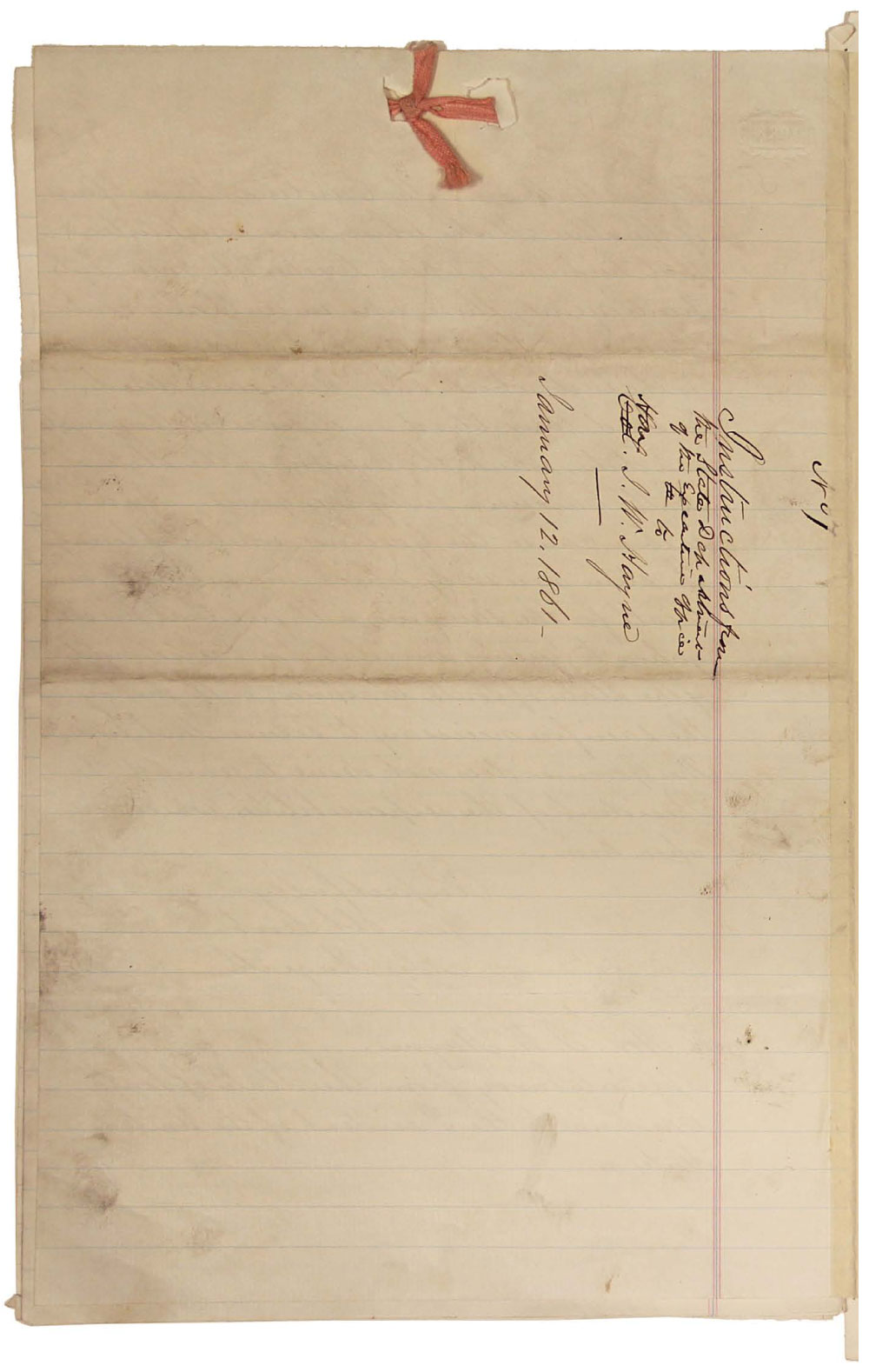
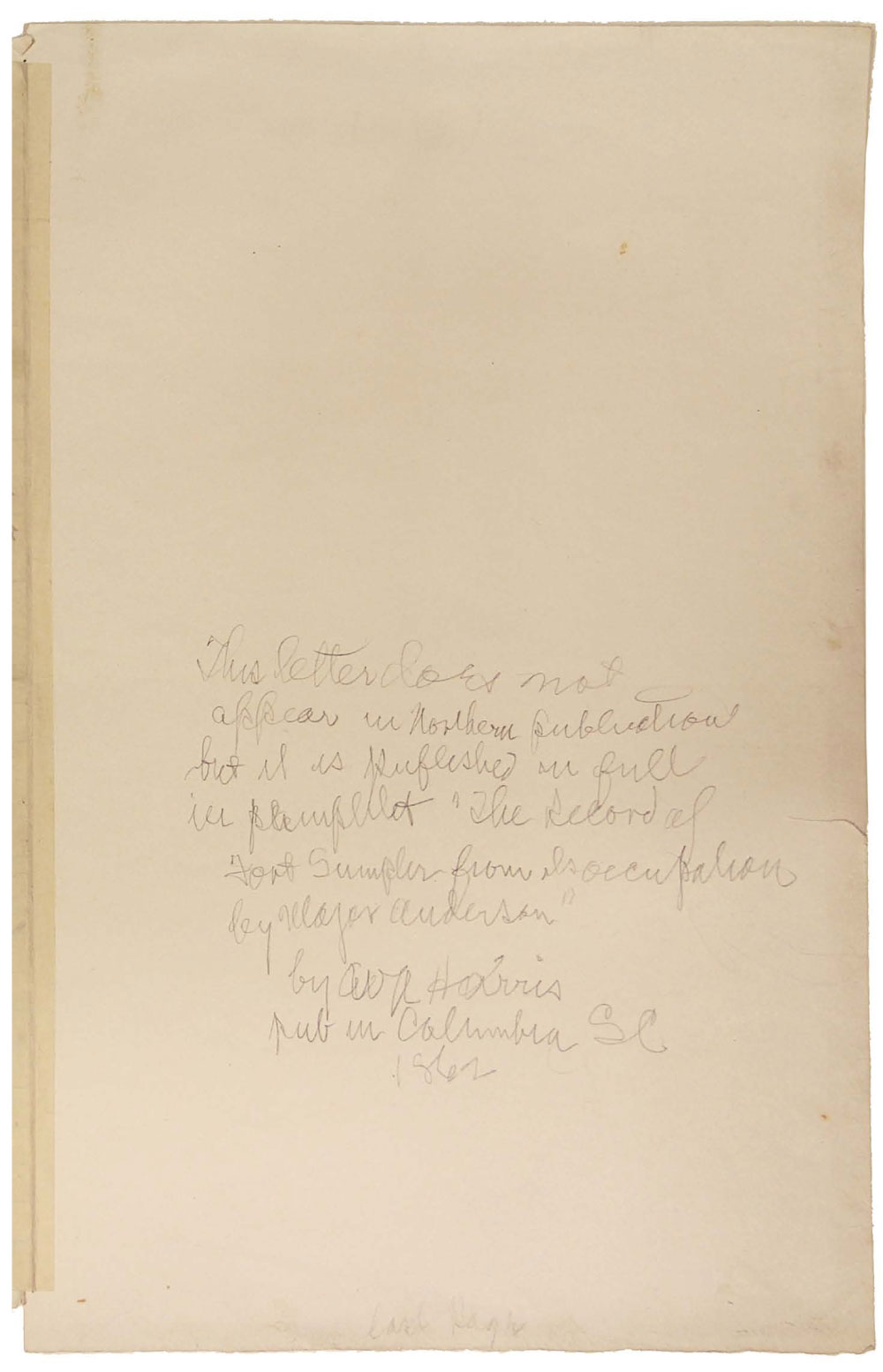
Our first offering (above) is the five-page set of instructions from A,G. McGrath the S.C. Secretary of State on behalf of Governor Pickens to Hayne dated January 12, 1861. This is in longhand on five pages of lined paper secured with the proverbial government red tape, with a cover sheet, the first page with a pre-printed heading: State of South Carolina, Executive Office, Sate Department, Charleston, with the filled-in date of January 12, 1861. The document is also docketed on reverse: Instructions from the State Department of the Executive Office to I.W. Hayne, and has on old pencil note on the contents on the cover sheet indicating this was not published until 1862, but I find a report of it in NY newspapers in 1861. McGrath was a South Carolina lawyer involved in the secession movement and served as S.C. Secretary of State until 1862 when Jefferson Davis appointed him to a judgship, and he later succeeded Milledge L. Bonham as Governor in 1864 (see another of our offerings below.) McGrath presents the Governor’s instructions to Hayne and lays out South Carolina’s position. The attempt to reinforce Fort Sumter had caused to the S.C. commissioners to cease negotiations and the Governor now demanded both a clarification of Washington’s position and the delivery of the fort to the state. Hayne was instructed to get a direct answer on whether Buchanan had ordered the reinforcements sent to Sumter: You are instructed to proceed to Washington, and there in the name of the Government of the State of South Carolina, enquire of the President of the United States whether it was by his order that troops of the United States were sent into the harbor of Charleston to reinforce Fort Sumter; and if he avows that order, you will then enquire whether he asserts a right to introduce troops of the United States within the limits of this State to occupy Fort Sumter; and you will in case of his avowal, inform him that neither will be permitted, and will be regarded as his declaration of War against the State of South Carolina. Hayne was allowed to negotiate and discuss payment for some Federal property, but was to be clear the possession of the fort was not a matter for discussion or negotiation: you will therefore require from the President of the United States a positive and distinct answer to your demand for the delivery of the Fort. Further, Hayne was instructed to tell Buchanan, that the Governor regards the attempt of the President of the United States, if avowed, to continue the possession of the Fort Sumter as inevitably leading to bloody issue In the light of the subsequent four years of war, death, and destruction, this seems an understatement. OUR PRICE FOR THIS DOCUMENT … $2,850.00 … SOLD
Click here to send us an e-mail.
or Call us @ 419-842-1863
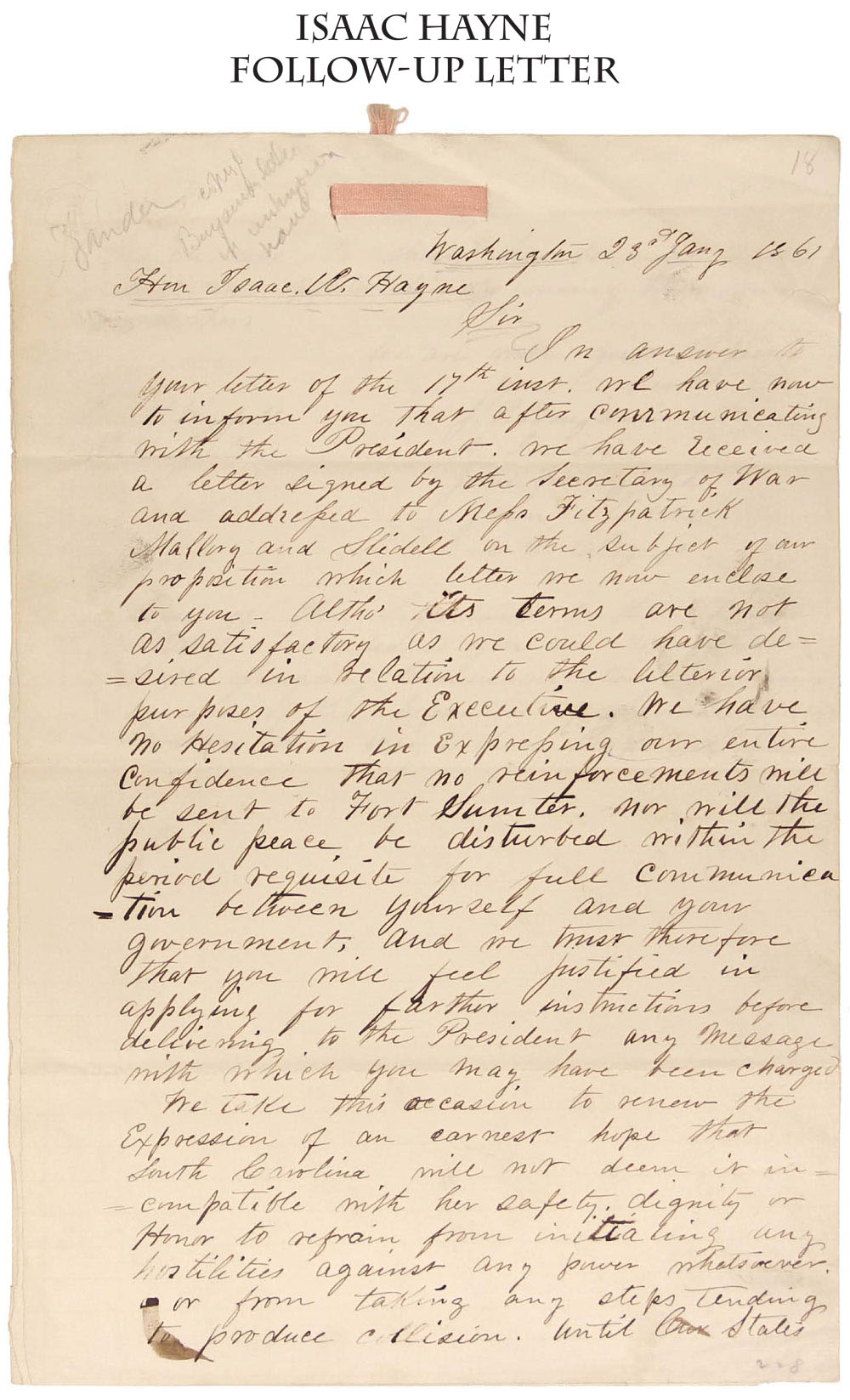
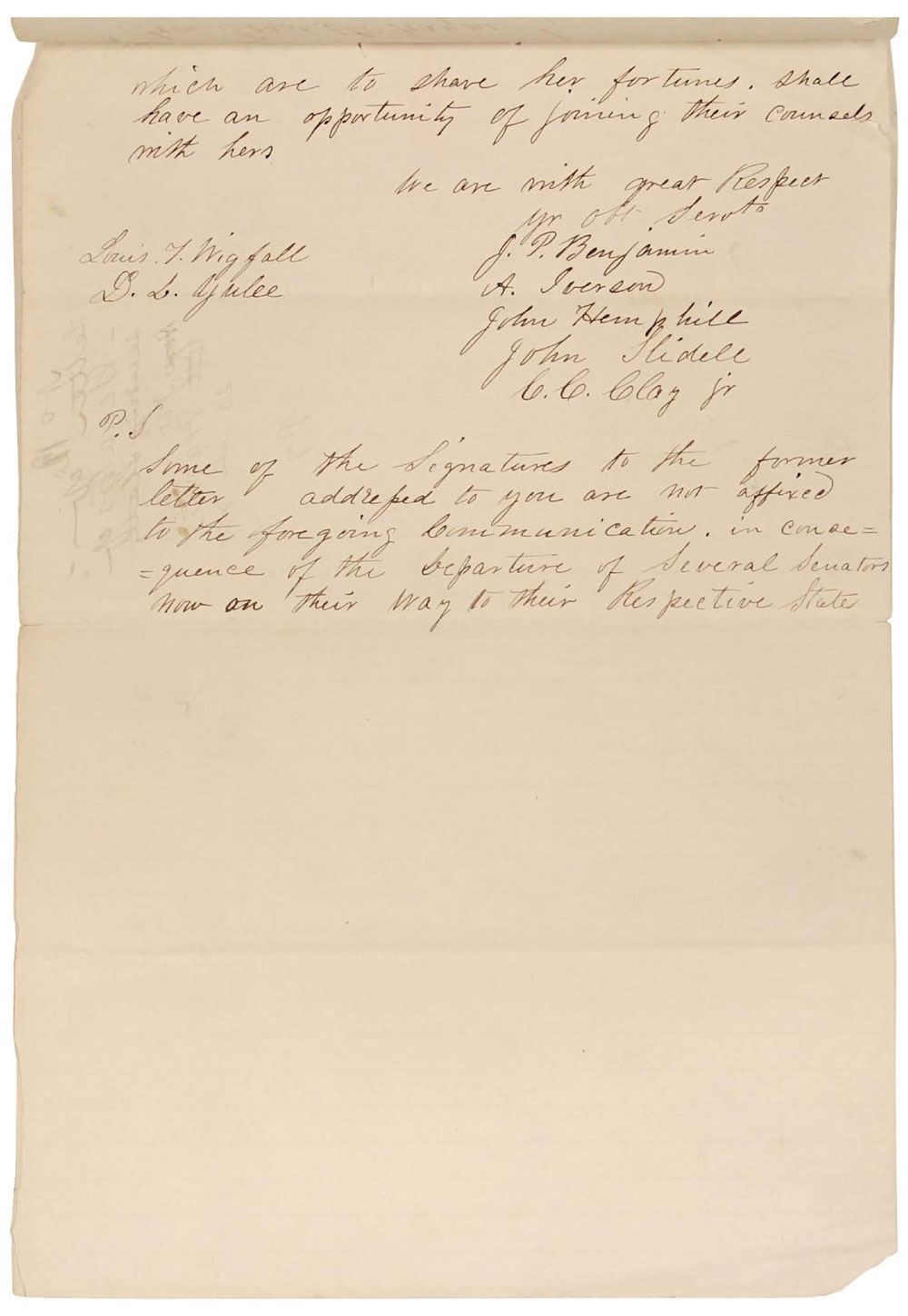
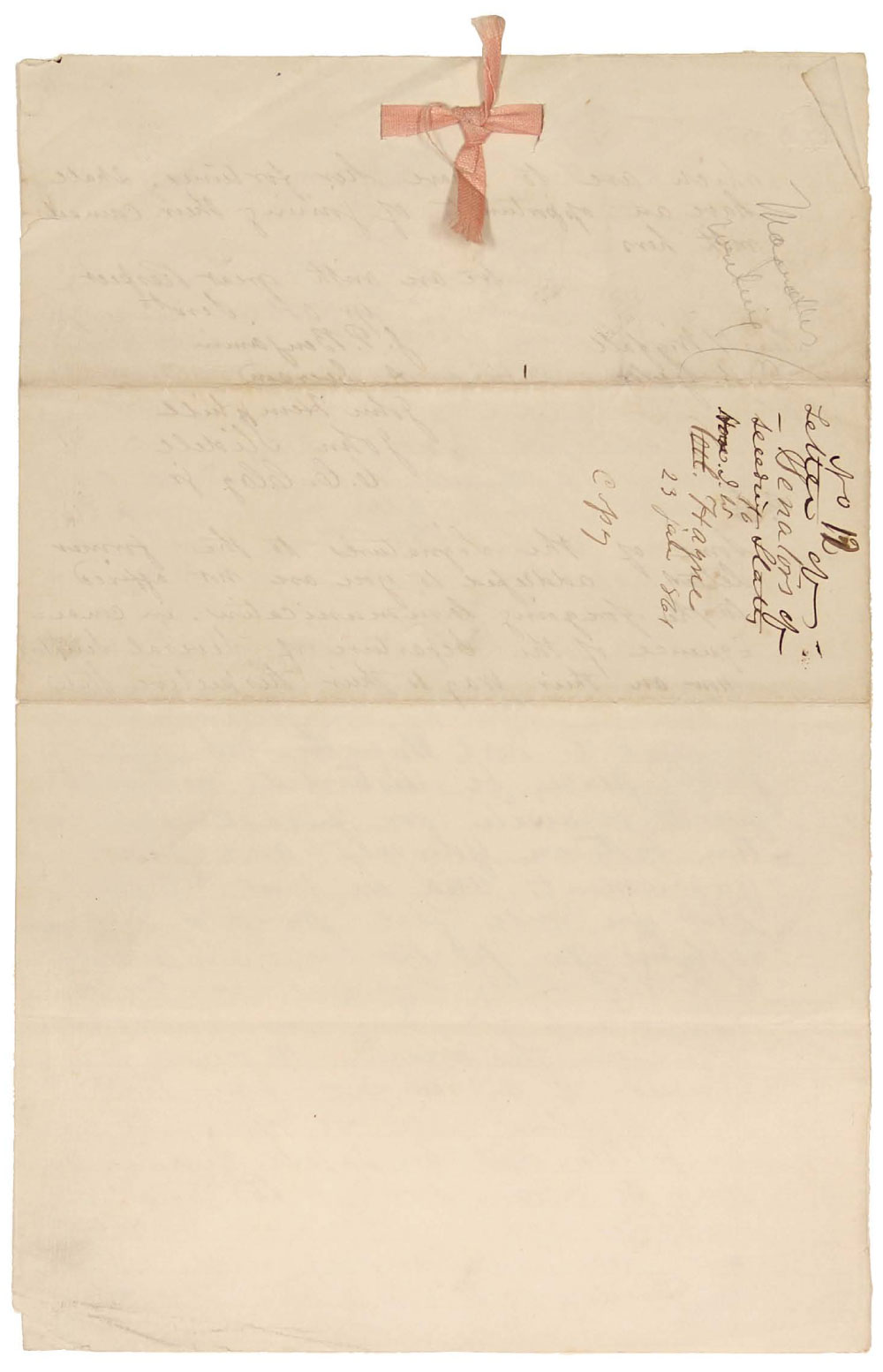
Our second offering (above) dates just a few days after Hayne arrived in Washington. On January 15 several Senators from other states that had seceded or were on the verge of doing so (among the visitors were Jefferson Davis and Judah Benjamin) asked Hayne to delay delivering his demand to the President, assuring him and the Governor of South Carolina that the arrival of the Star of the West was not an attack on the state and suggesting that negotiations might still resolve the question of Federal facilities. They advised delay at least until February 15, by which time they expected their own states would meet in convention with South Carolina and form a new Confederation and Provisional government. They hoped the delay would allow for, calm and deliberate counsel, and that together they might come to some wise just and peaceable solution of existing difficulties. They must have been also worried that South Carolina might provoke outright war prematurely. We offer Hayne’s response to this letter from the Senators of seceded states, dated January, 1861, but probably January 17, given a subsequent reference in another document. In our letter Hayne acknowledges the Senators letter and its contents: that your people feel they have a common destiny with our people, and expect to form with them in that Convention a new Confederacy and Provisional Government; that you must, and will share our fortunes, suffering with us the evils of war, if it cannot be avoided, and enjoying with us the blessings of peace, if it can be preserved. Hayne then agrees to delay delivering the demand until he can hear from the Governor and assures them that the state has not cut off Anderson and Fort Sumter from essential supplies and communications. Two pages in ink. Tied at top with red tape. Docketed on reverse. OUR PRICE FOR THIS DOCUMENT … $ 1450.00
Click here to send us an e-mail.
or Call us @ 419-842-1863
Shortly after the above exchange, President Buchanan addressed a letter to the Senators through Secretary of War Holt to buy time, maintaining that his actions so far had been without any hostile or unfriendly purpose to South Carolina, but simply to protect and preserve U.S. public property and that while he could not promise no further reinforcements would be sent to Sumter or any act of hostility would take place, since the power to wage war rested with Congress, he did not deem it necessary at the moment to reinforce Anderson.
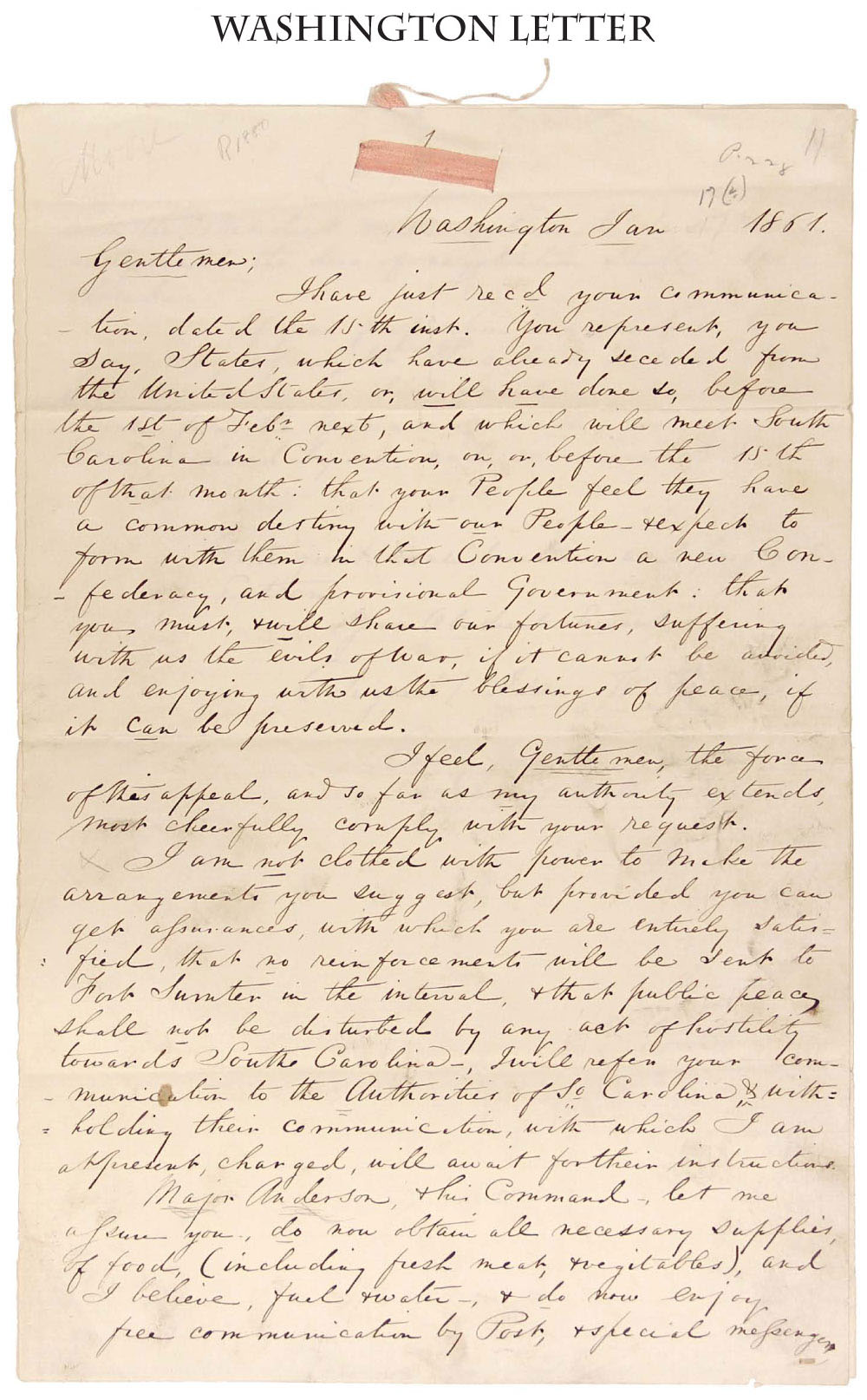
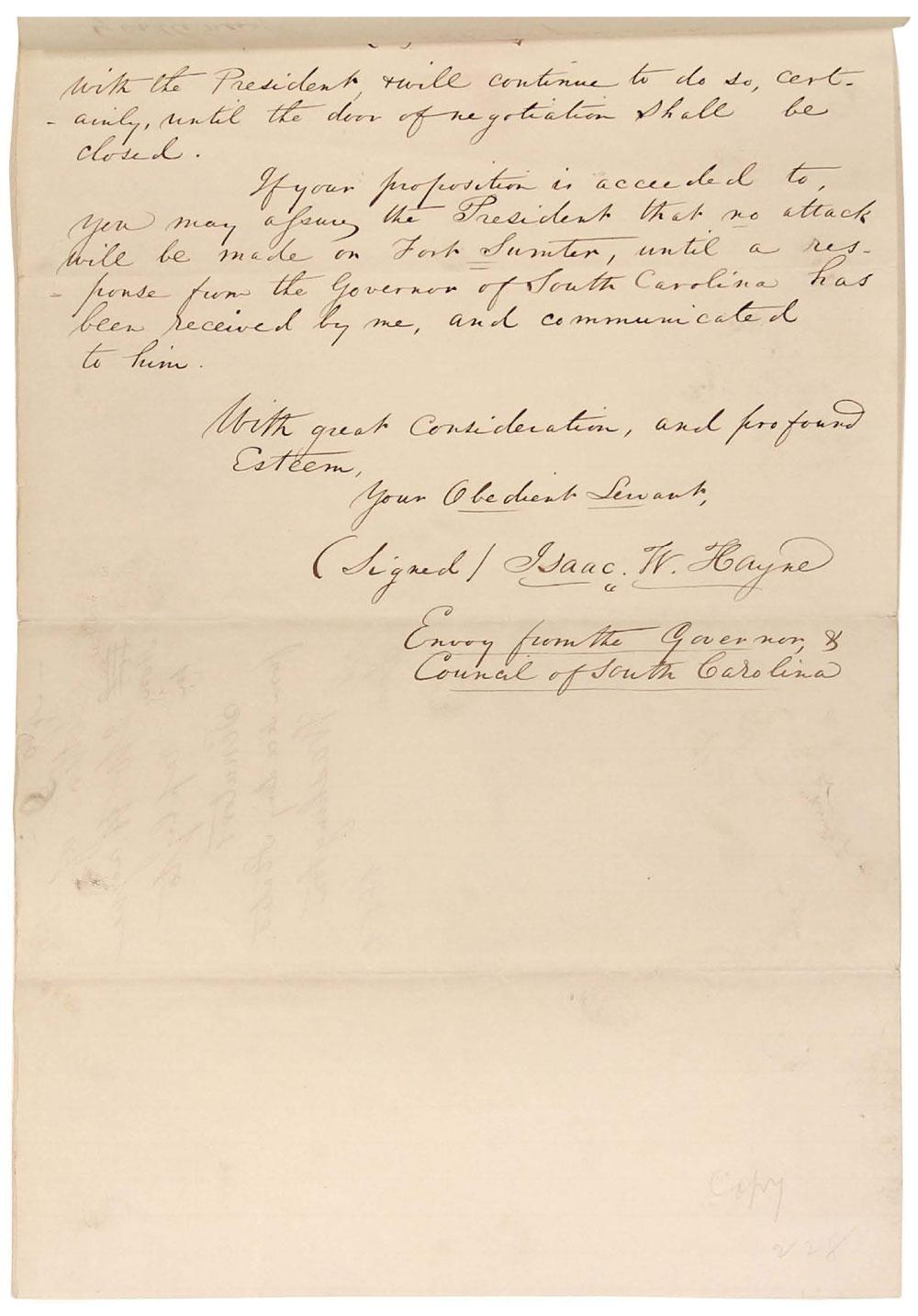
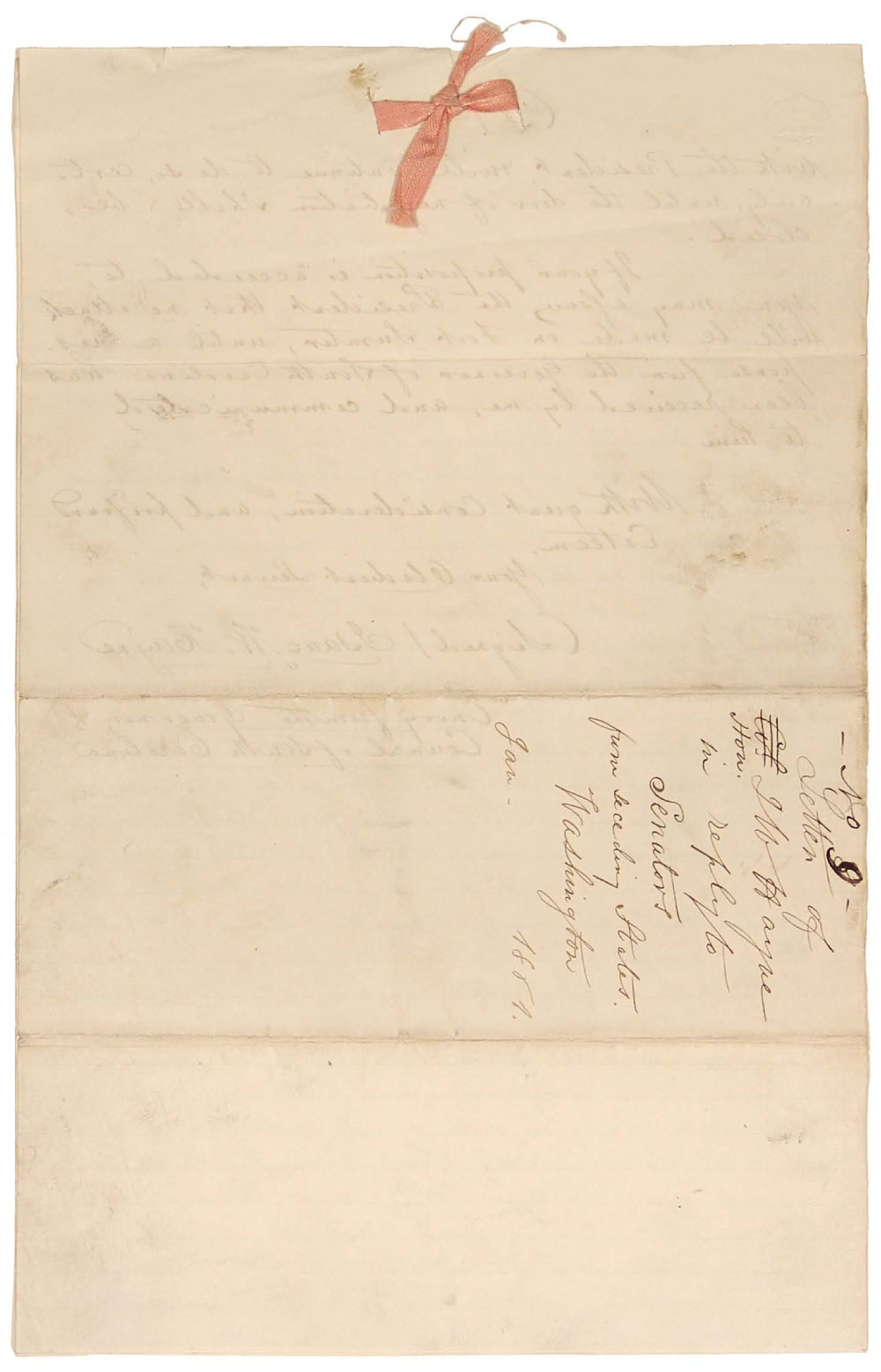
Our third offering (above) is a copy of the follow-up letter sent to Hayne by the Senators of seceding states who still remained at Washington, dated January 23, 1861. Two pages, ink, bound at top by red tape. Docketed reverse: “No 12 Letter of Senators of Seceding States to I.W. Hayne 23 Jan. 1861 Copy”
In this letter the Senators who had asked Hayne to delay delivering his demand to the President enclose the letter from the Secretary of War (not included with this.) “Altho’ its terms are not as satisfactory as we could have desired in relation to the Ulterior purposes of the Executive, we have no hesitation in expressing our entire confidence that no reinforcements will be set to Fort Sumter, not will the public peace be disturbed within the period requisite for full communication between yourself and your government…” They therefore again ask Hayne to delay delivering his demand and express the hope that, “South Carolina will not deem it incompatible with her safety, dignity or Honor to refrain from initializing any hostilities against any power whatsoever or from taking any steps tending to produce collision until our States which are to share her fortunes shall have an opportunity of joining their counsels with hers.” The letter was then signed by seven of the Senators who had signed the earlier letter, with a note that the others had returned to their respective states.
Needless to say, these attempts to avoid a conflict failed. Hayne finally presented his demand for Fort Sumter to the President on February 6, a provisional constitution for the Confederacy was adopted February 8, Jefferson Davis was elected provisional President the next day, and war would now decide whether there existed one country or two. OUR PRICE FOR THIS DOCUMENT … $ 1750.00
Click here to send us an e-mail.
or Call us @ 419-842-1863
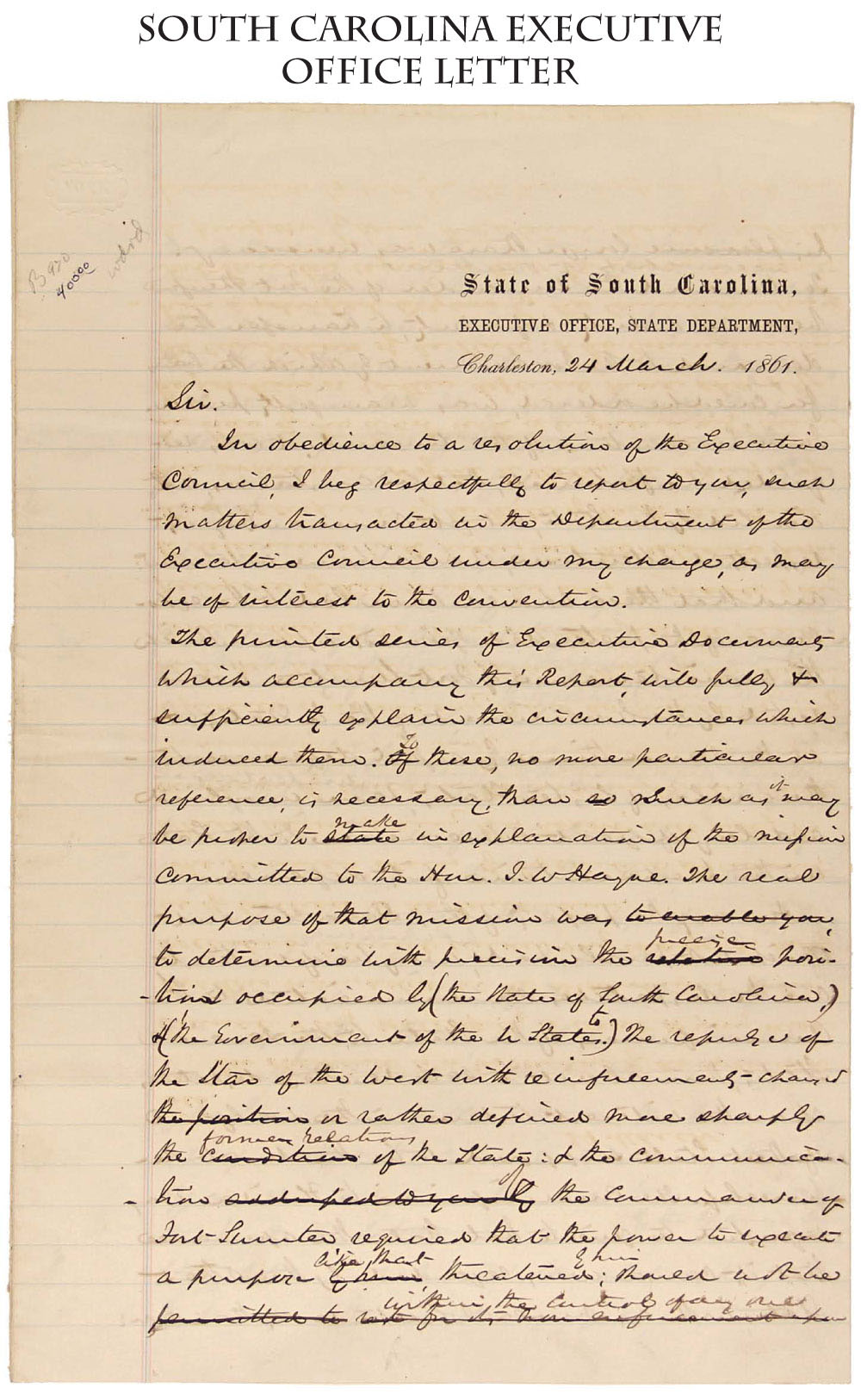
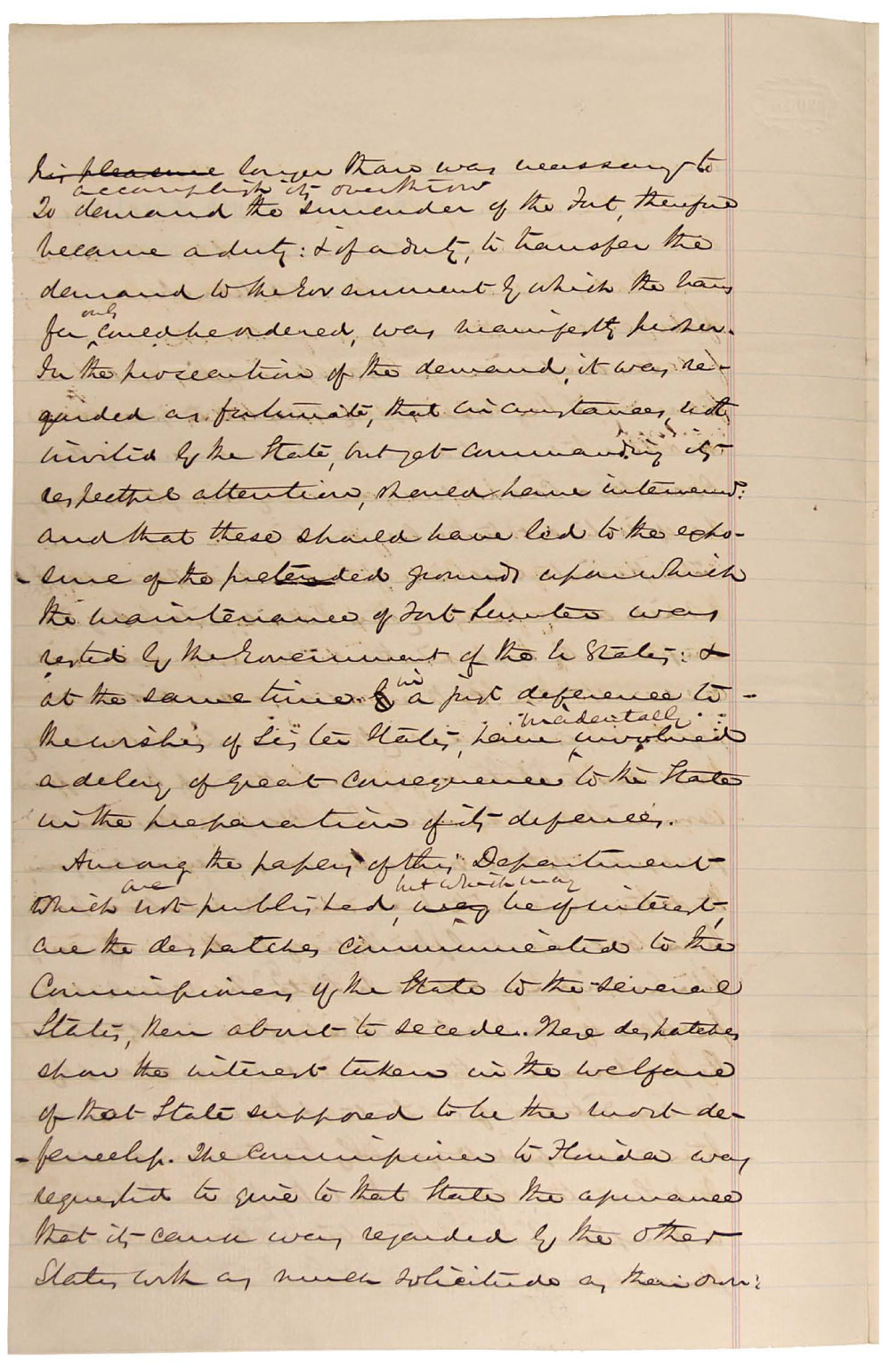
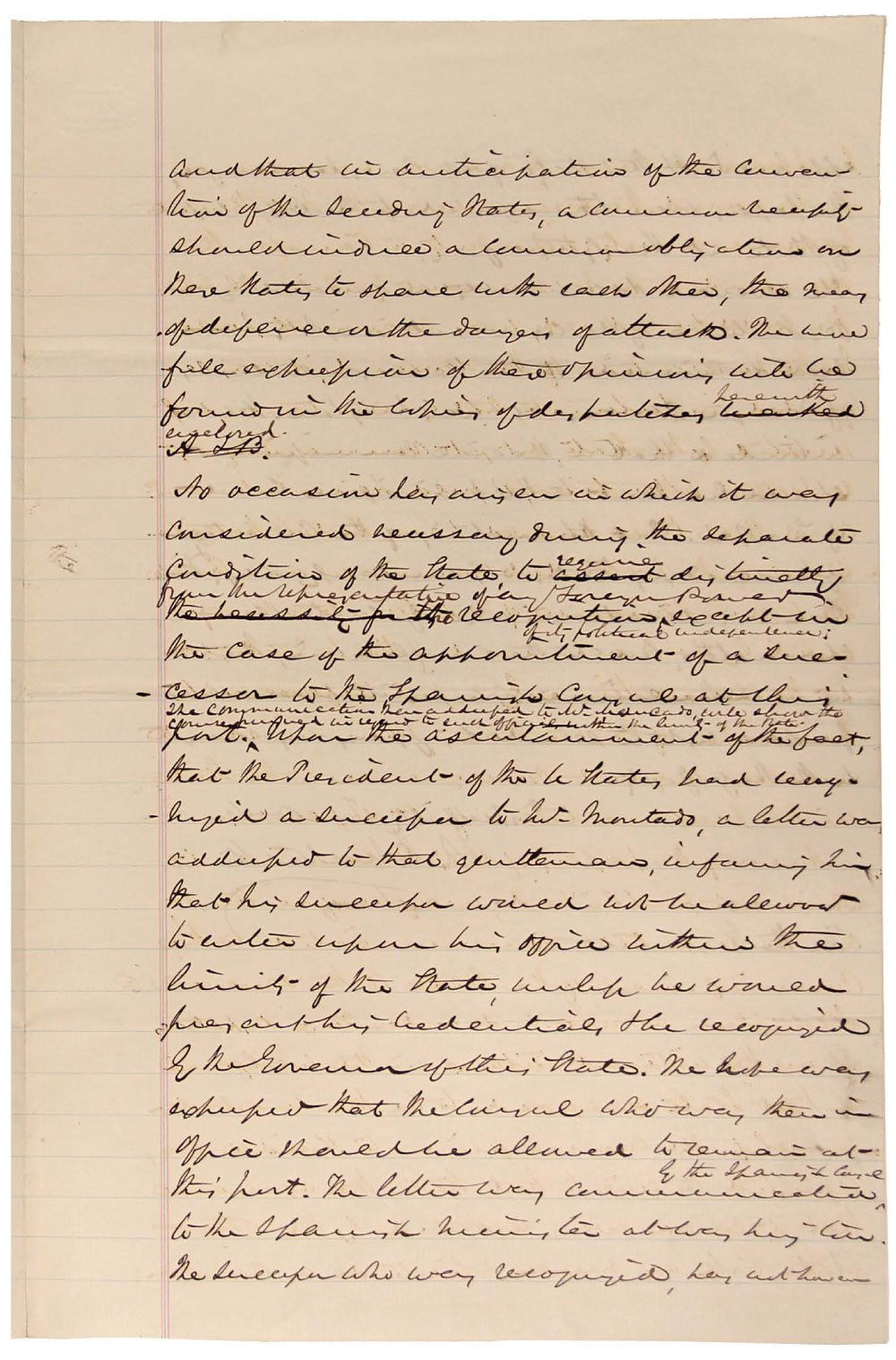
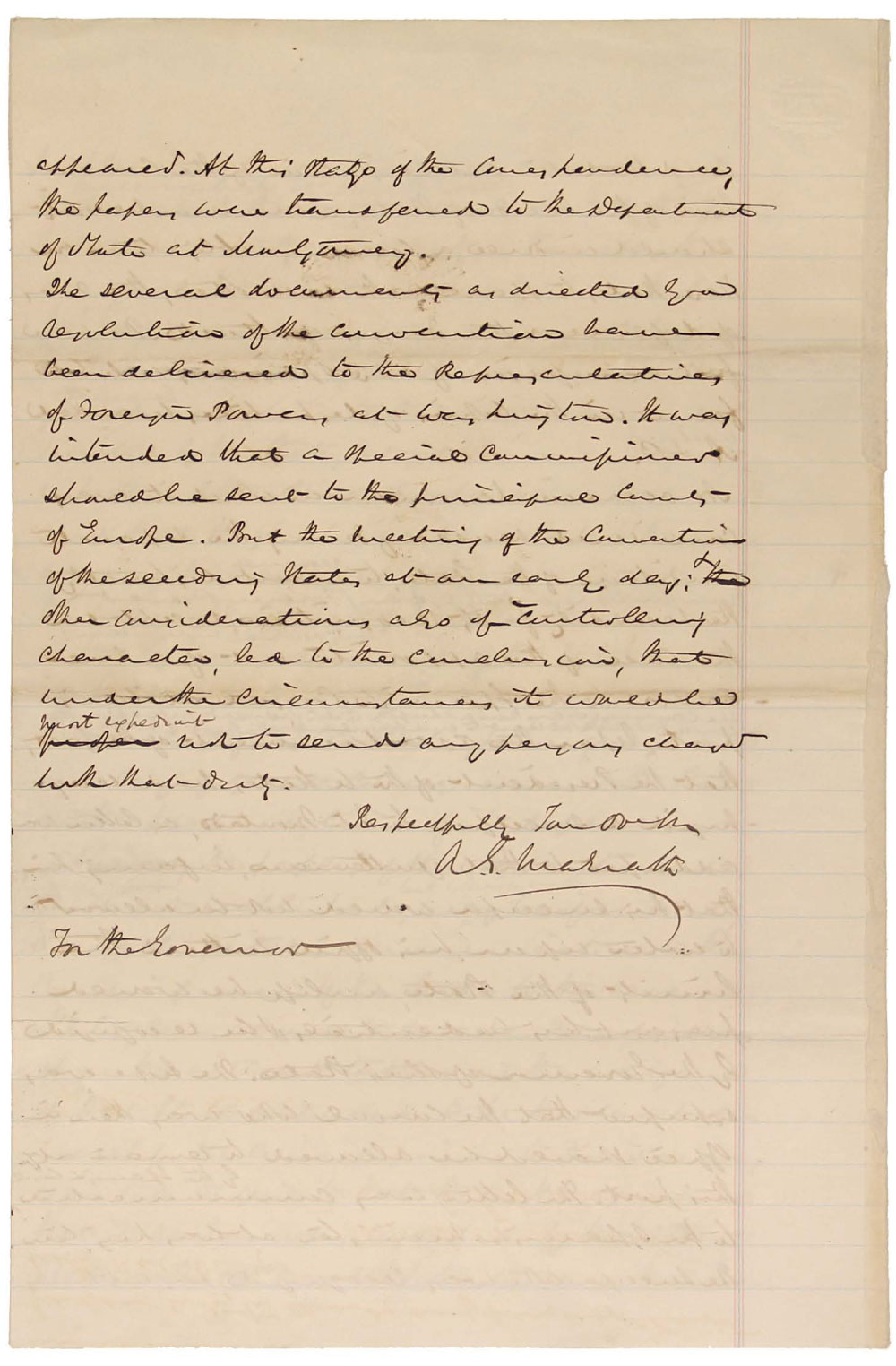
Our fourth offering (above) from this archive is a letter from South Carolina Secretary of State McGrath to the Governor on March 24, 1861, outlining recent actions taken in the state’s Executive Council. Preprinted heading of “Executive Office, State Department, Charleston,” with filled in date of “24 March, 1861.” Four pages ink. Interlineations, additions and deletions indicate this may be the original draft of the communication in McGrath’s hand. The letter refers to several enclosures, not with it, but deals with Fort Sumter, the crisis provoked by the Star of the West, and Isaac Hayne’s mission. Additional reference is made to the secession of Florida and its commissioner’s appeal for aid, and lastly to the issue of recognition of South Carolina by foreign powers after its secession but before the formation of the Confederacy, an issue that had come up with the appointment of a new Spanish Consul and the determination of the Governor not to allow him to take up his post (at Charleston, we presume) unless he presented his credentials to be recognized by the Governor. That matter had since been referred to the new Confederate Department of State in Montgomery. This presents another interesting insight into South Carolina affairs in late 1860 and early 1861, when the state was considering its own status as a sovereign nation and the brief period between its secession from the Union and joining the Confederacy. Interestingly, McGrath as a judge was interested in limiting not only Federal power, but also the power of the central Confederate government, an interesting problem in the midst of a war. OUR PRICE FOR THIS DOCUMENT … $1350.00
Click here to send us an e-mail.
or Call us @ 419-842-1863

Our fifth offering (5A above, 5B and 5C below) from this group is the August 17, 1863, Proclamation by South Carolina Governor Milledge L. Bonham ordering the evacuation of non-combatants from Charleston: “Whereas Charleston is beleagured by our foe with a powerful land & naval force requiring us to put forth every energy and to submit to every sacrifice that the good of our cause may demand…” Bonham (1813-1890) was former US Army officer who had served in the Seminole and Mexican Wars. His older brother, James Butler Bonham, died at the Alamo. Milledge Bonham served in the South Carolina militia, as a state representative, and as a member of congress, where he replaced his cousin, Preston Brooks, who had famously caned Charles Sumner. Bonham was a commissioner from South Carolina to the secession convention in Mississippi and eventually a brigadier general in the Confederate Army. He returned to politics to be elected Governor by the South Carolina General Assembly in late 1862 and served until late 1864, when he went back to military duty.
A state convention in January, 1863, had decided Charleston should be defended at all costs- they would “prefer a repulse of the enemy with the entire city in ruins to an evacuation or surrender on any terms whatever…” and appointed a commission to supervise the evacuation of non-combatants, “negroes & other property,” when they thought it necessary. In July the commanding General had advised the evacuation take place, but not much had been done about it. Bonham therefore published this proclamation “recommending” and “enjoining upon” all good citizens to undertake the evacuation and the appointed commissioners to use their powers to enforce it if necessary.
As with the McGrath letter in this group, handwritten corrections, deletions and additions indicate we are close to the original manuscript of this proclamation. OUR PRICE FOR THESE DOCUMENTS … $2,500.00
Click here to send us an e-mail.
or Call us @ 419-842-1863
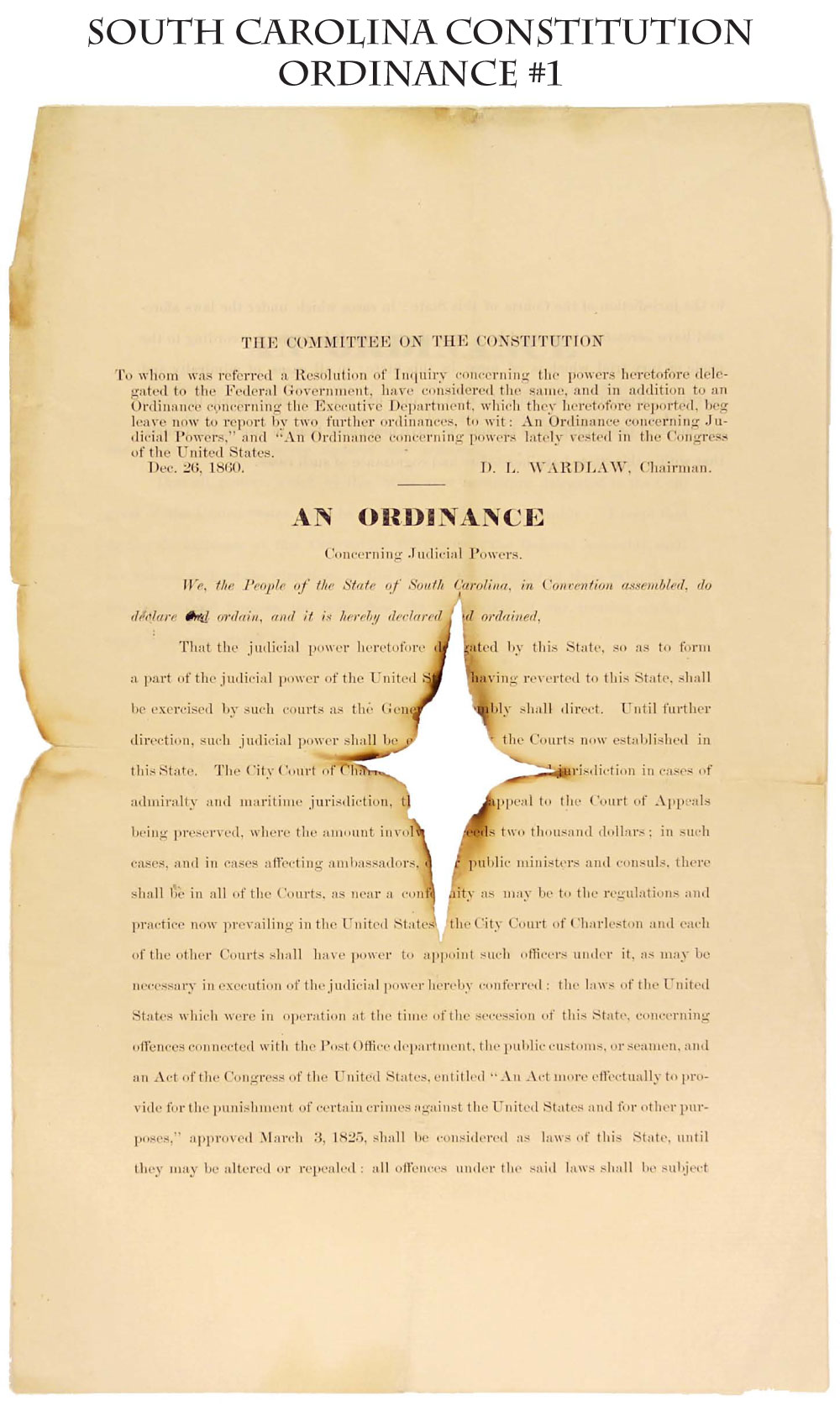
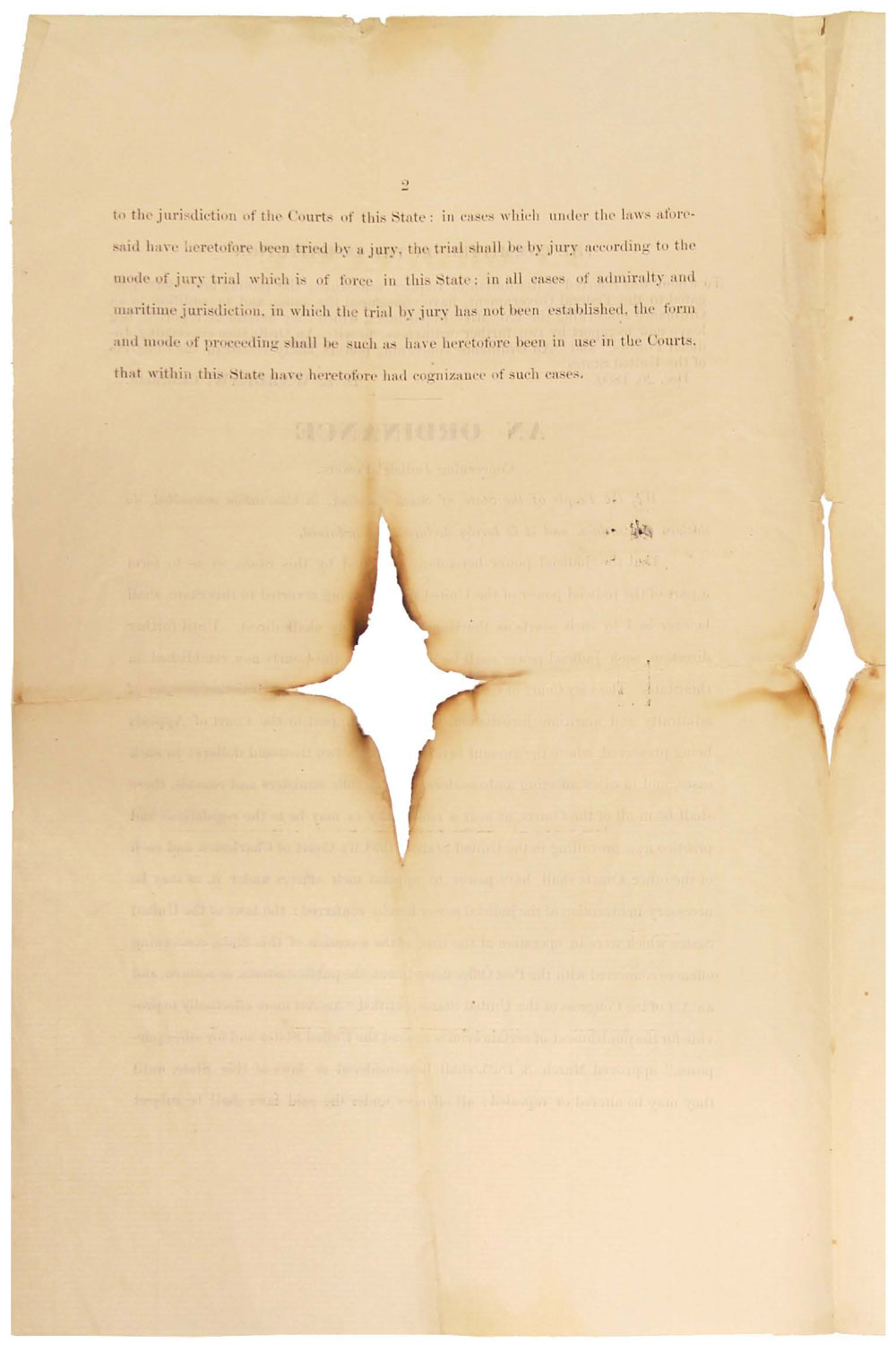
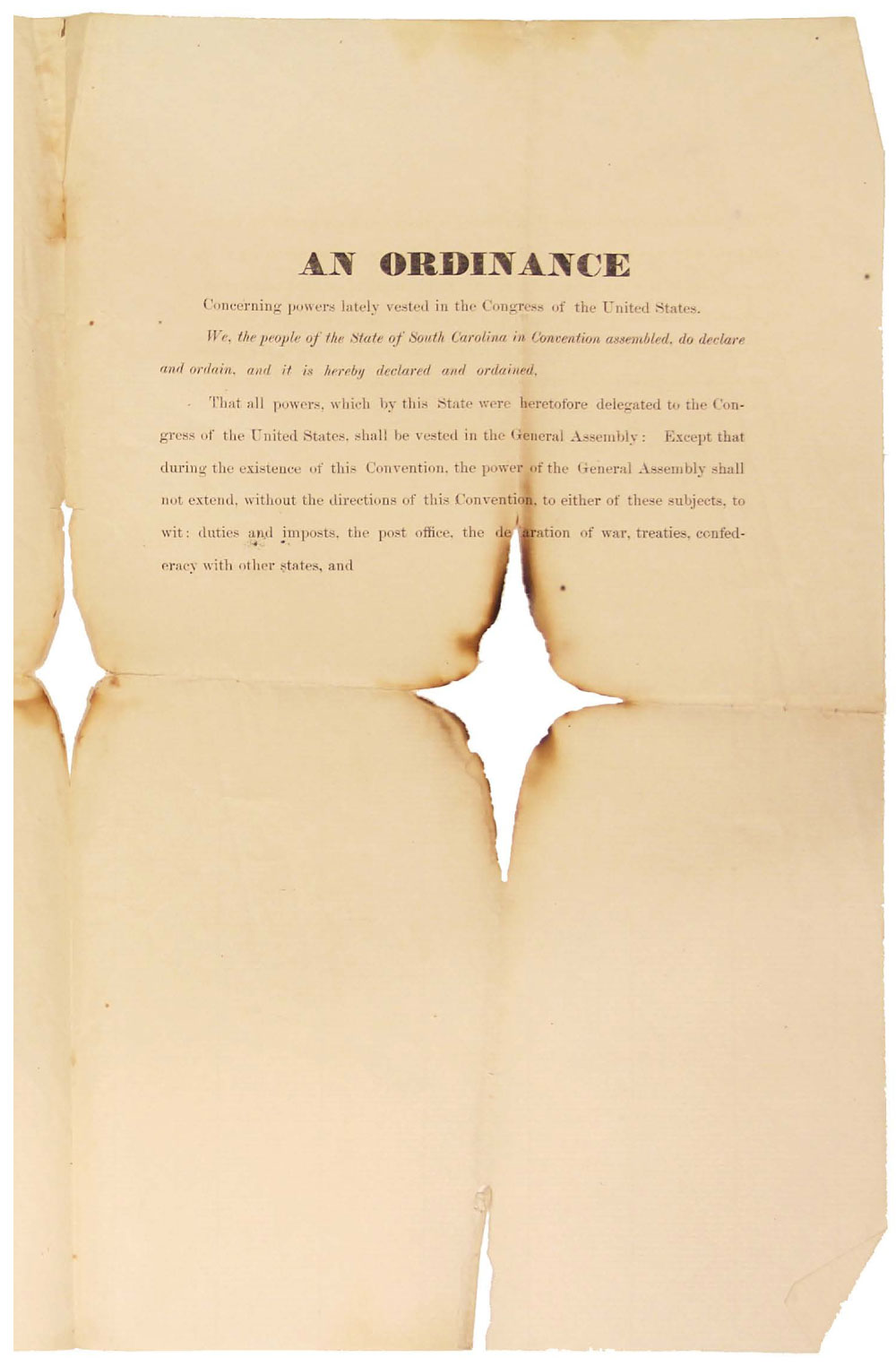
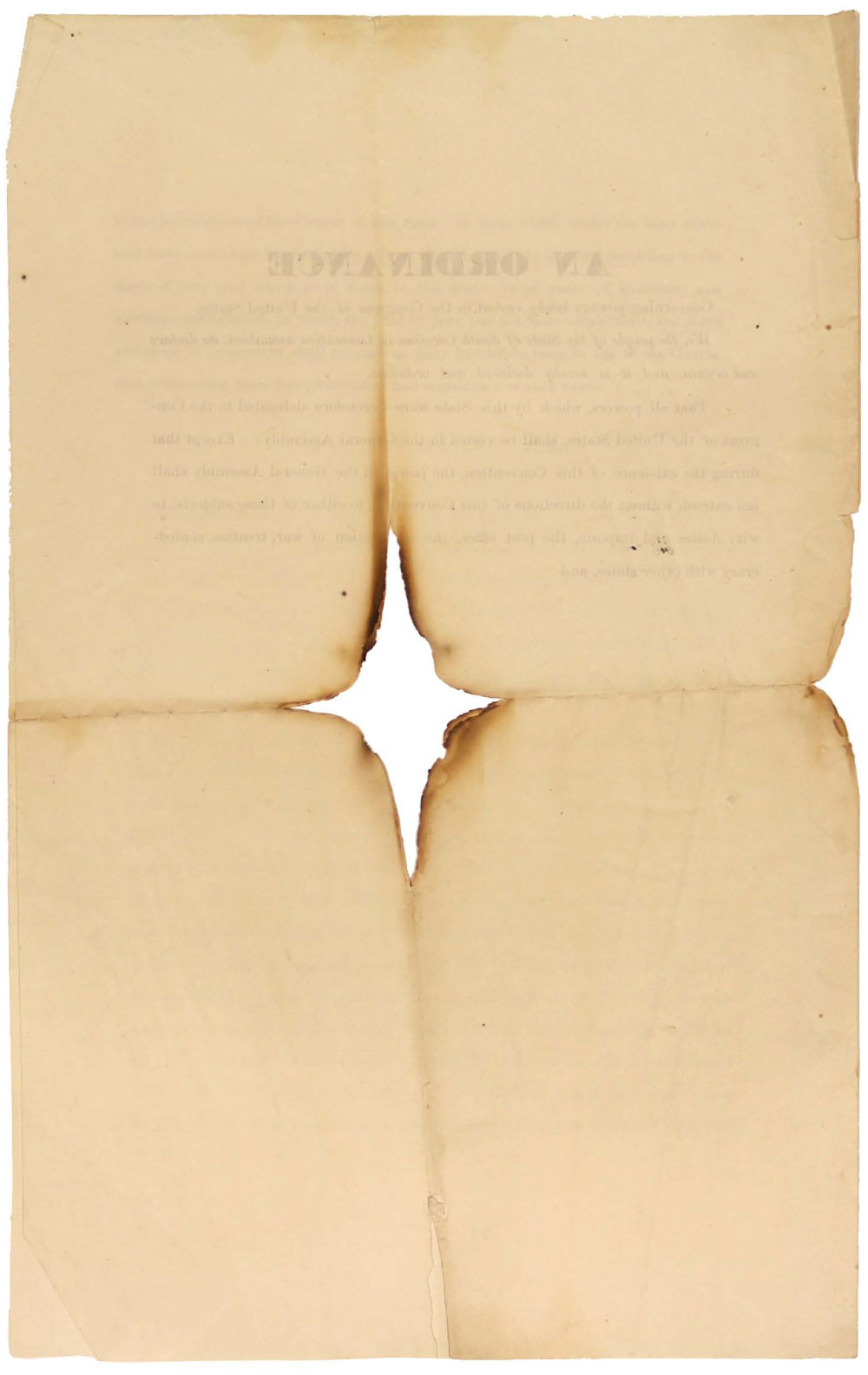
South Carolina Constitution Ordinance #1 … 5B (sold with 5A Above and 5C Below) OUR PRICE FOR THESE DOCUMENTS … $2,500.00
Click here to send us an e-mail.
or Call us @ 419-842-1863
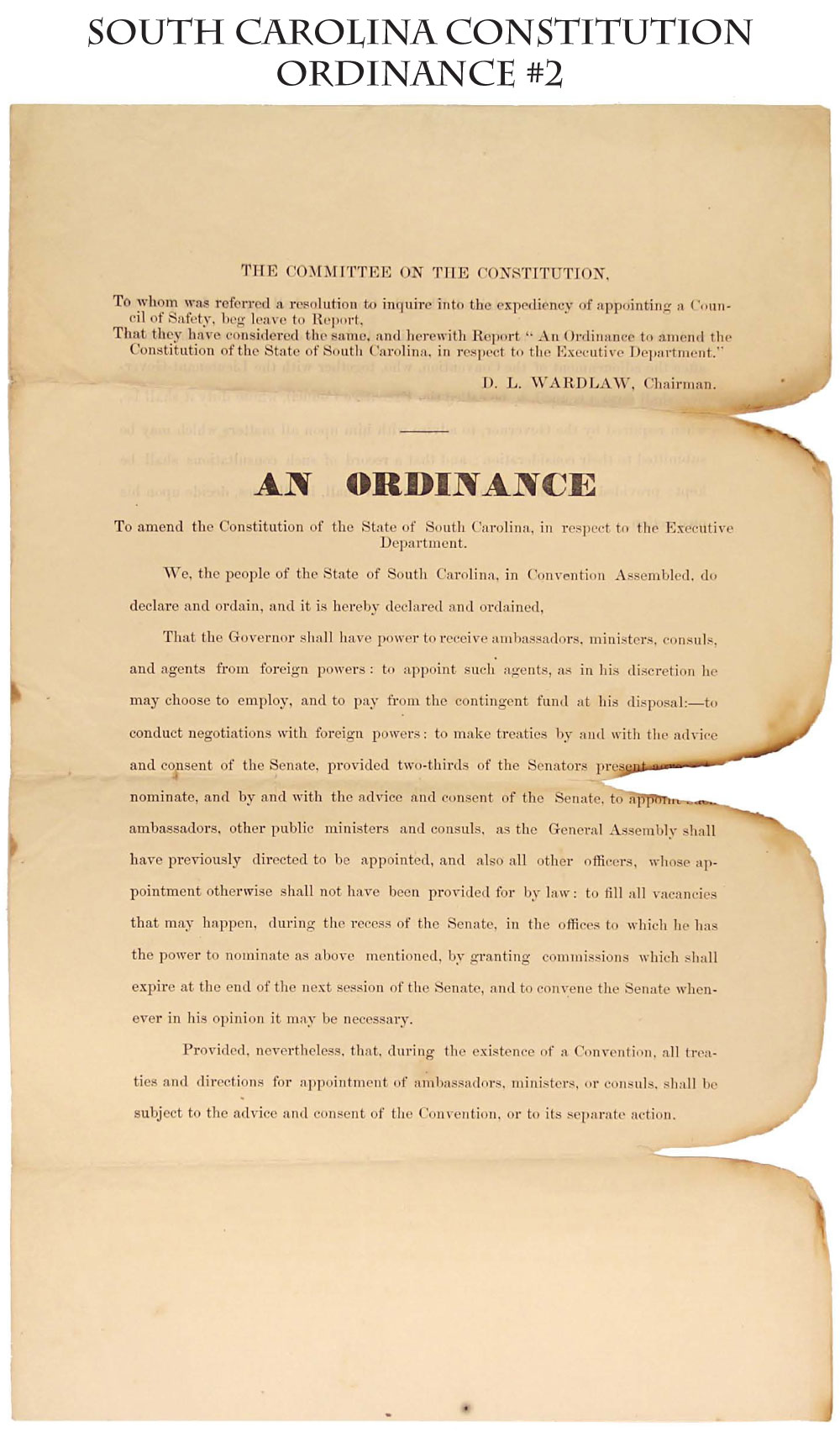
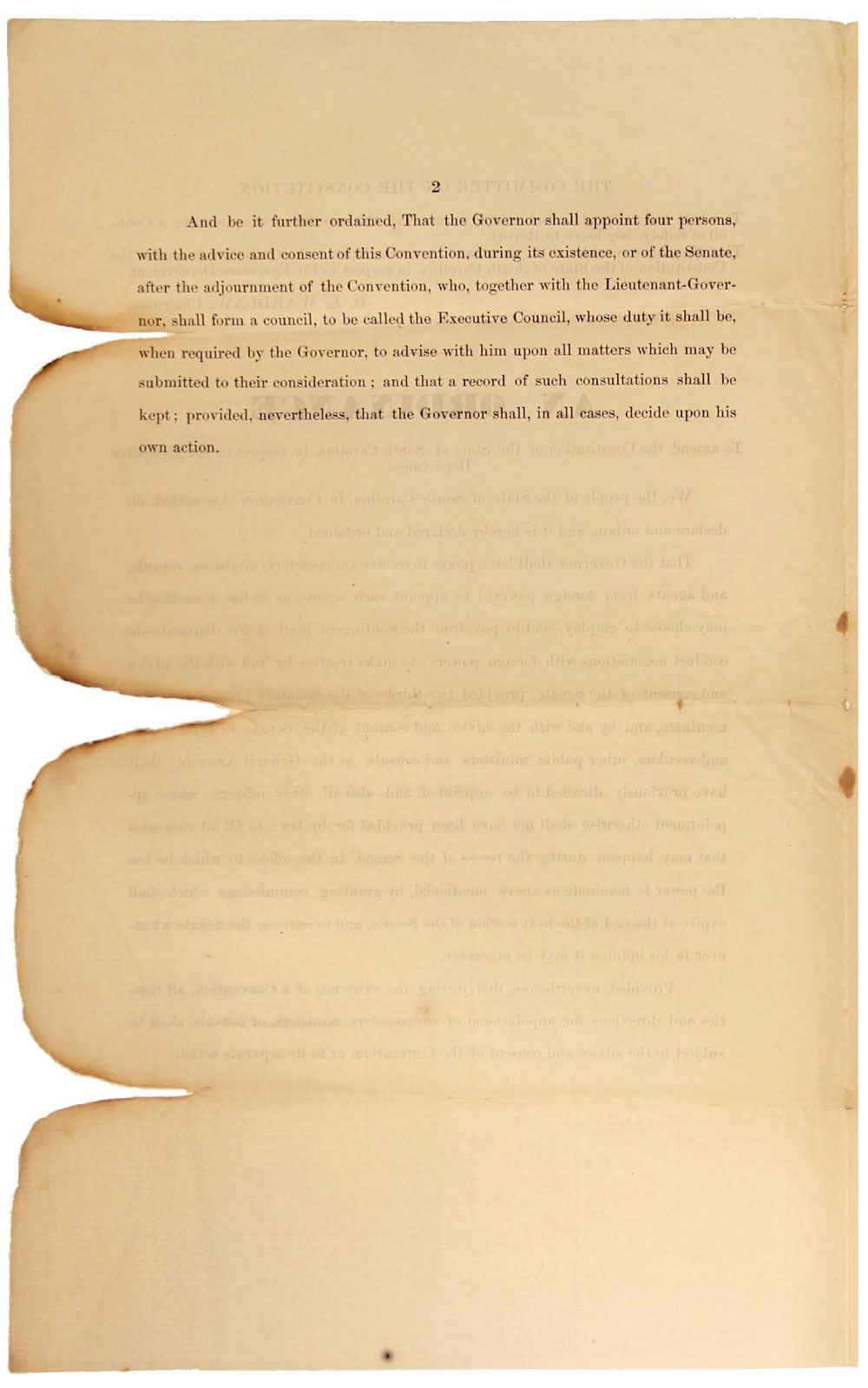
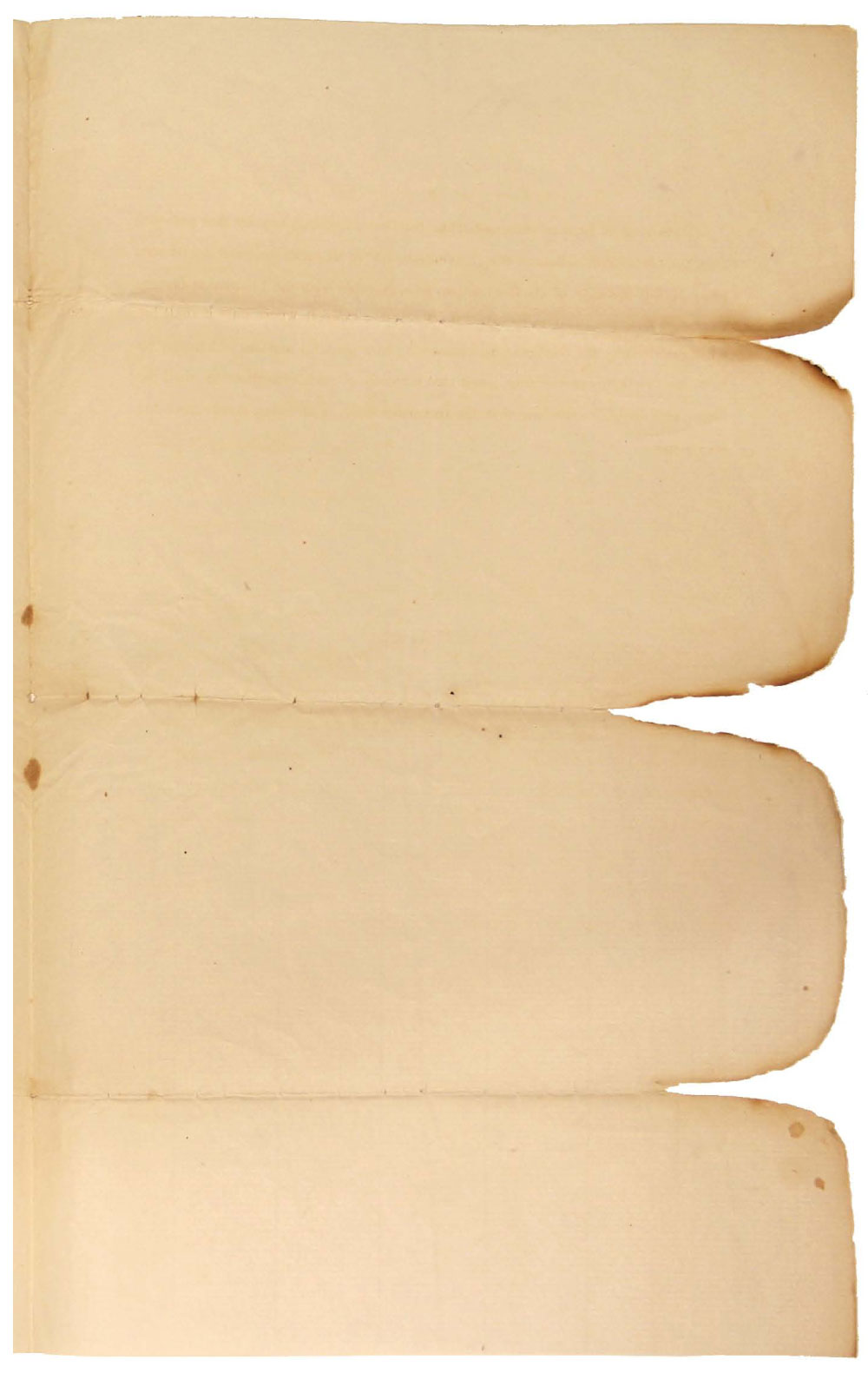
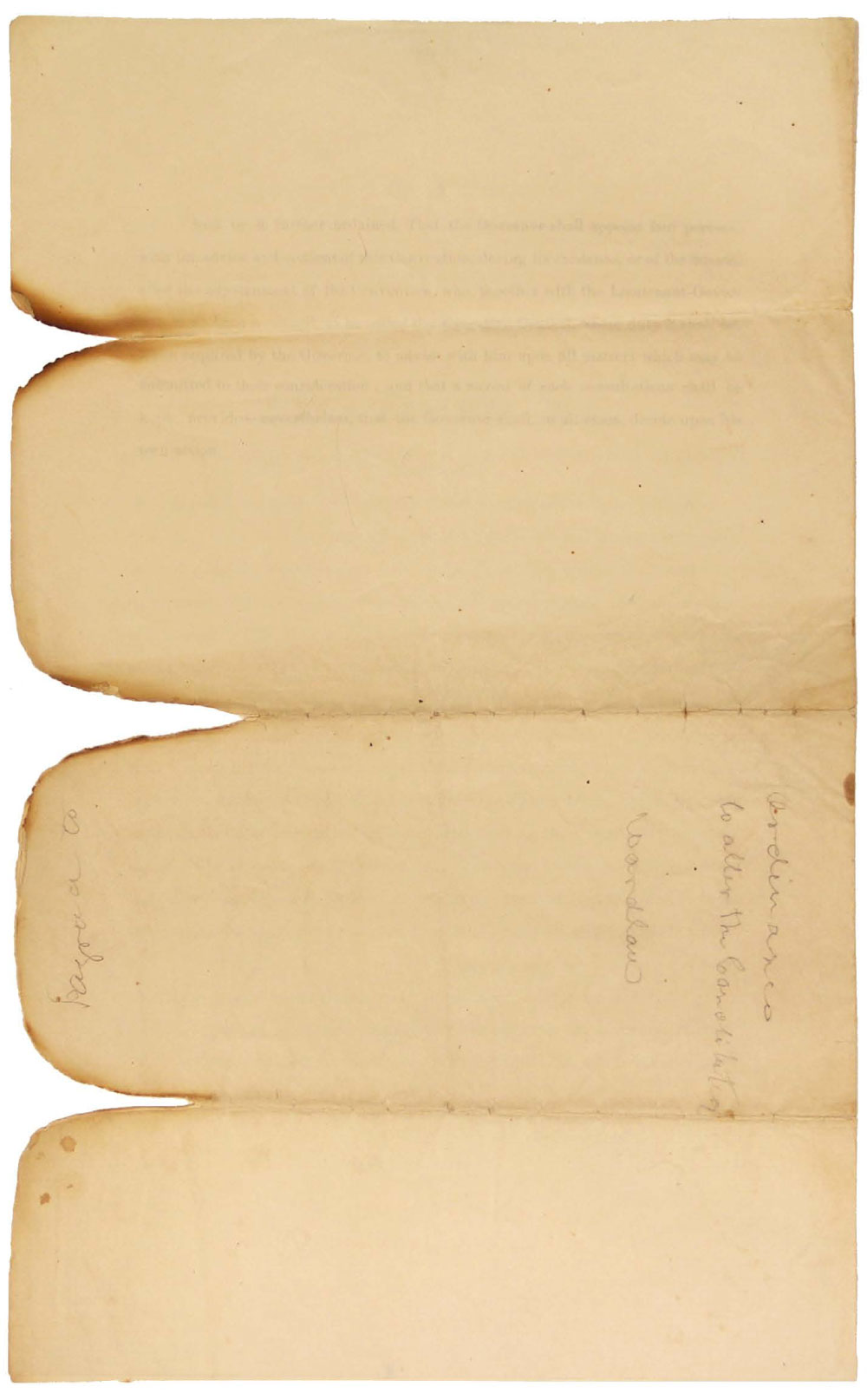
South Carolina Constitution Ordinance #2 … 5C (sold with 5A and 5B above) OUR PRICE FOR THESE DOCUMENTS … $2,500.00
Click here to send us an e-mail.
or Call us @ 419-842-1863
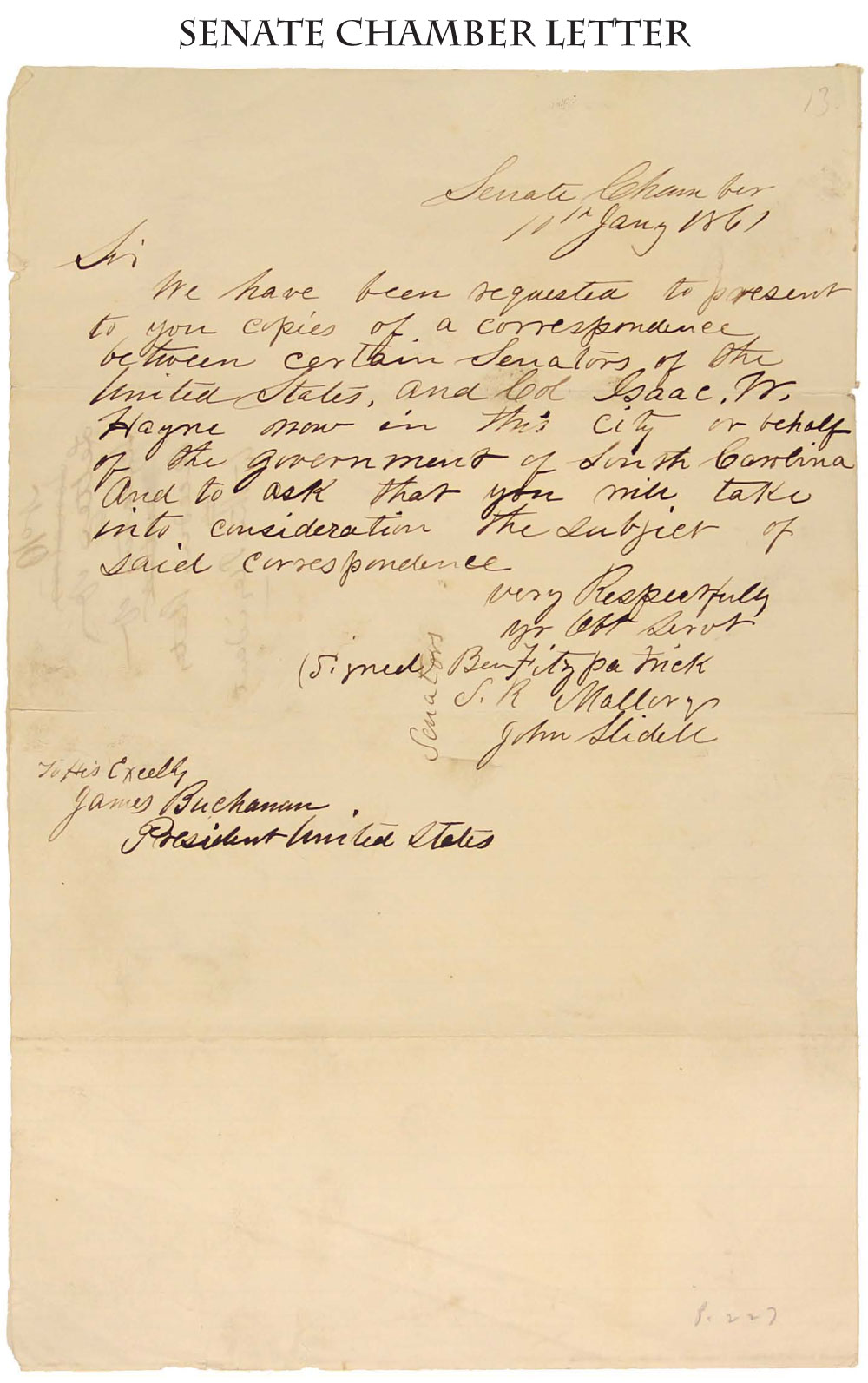
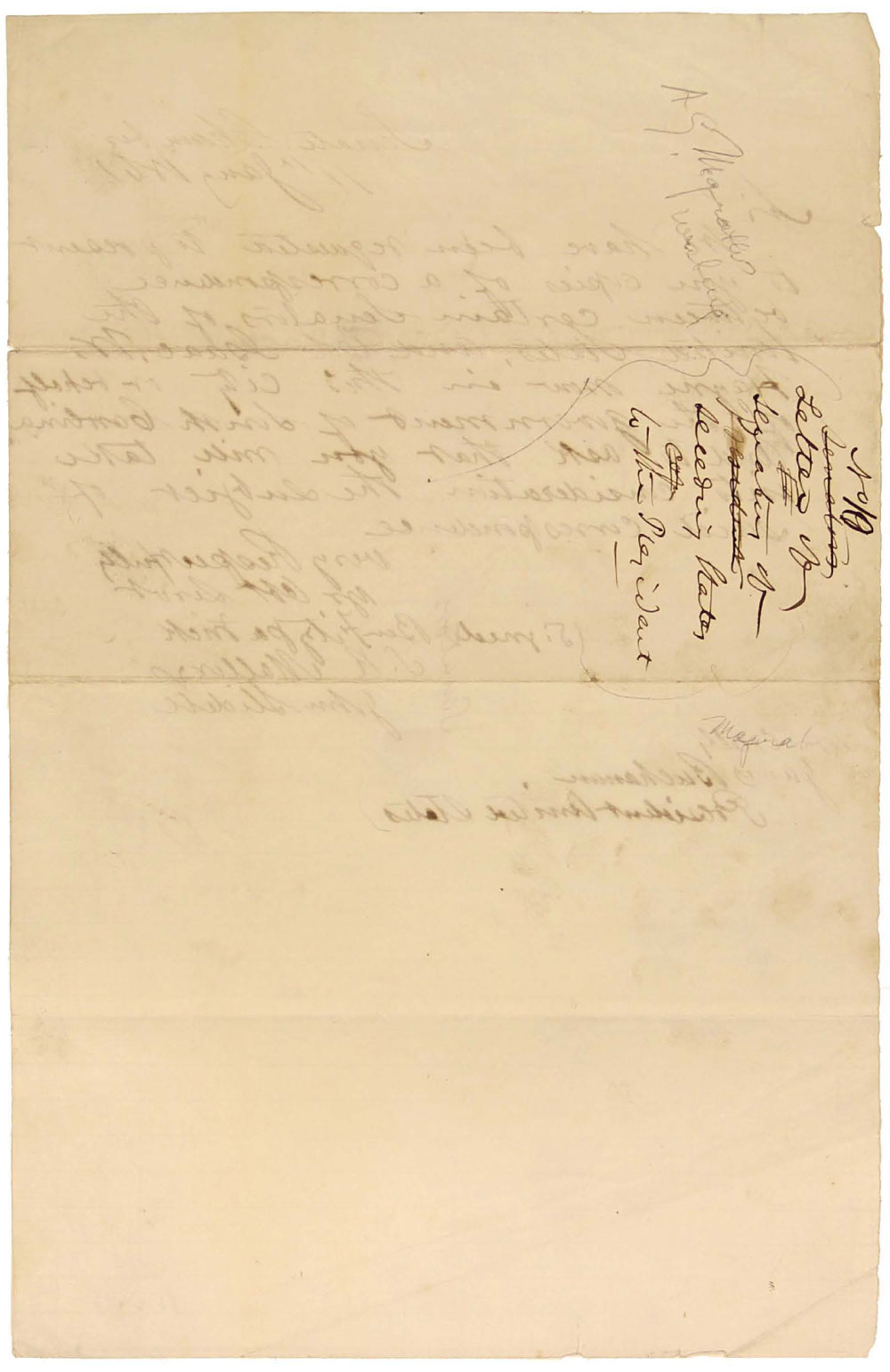
Senate Chamber Letter … $850.00
Click here to send us an e-mail.
or Call us @ 419-842-1863
Layaways are Welcome
Need to split your order into multiple payments? No problem! A simple 20% earnest money deposit will hold your item for you.-acf
You can then pay it off in easy installments that fit your budget.
Read Terms Here
Items to Sell? Contact Us
I am always interested in buying ANYTHING from the American Civil War… Guns, Swords, Civil War Muskets, Knives, Uniforms, Flags, Medals, Badges, Diaries, Letters, Autographs, Buttons, photographs, tintypes, daguerreotypes, Insignia, Camp Items, Battlefield Relics, canteens, Drums, Etc… Call 419-842-1863 and ask for Dave Taylor.


